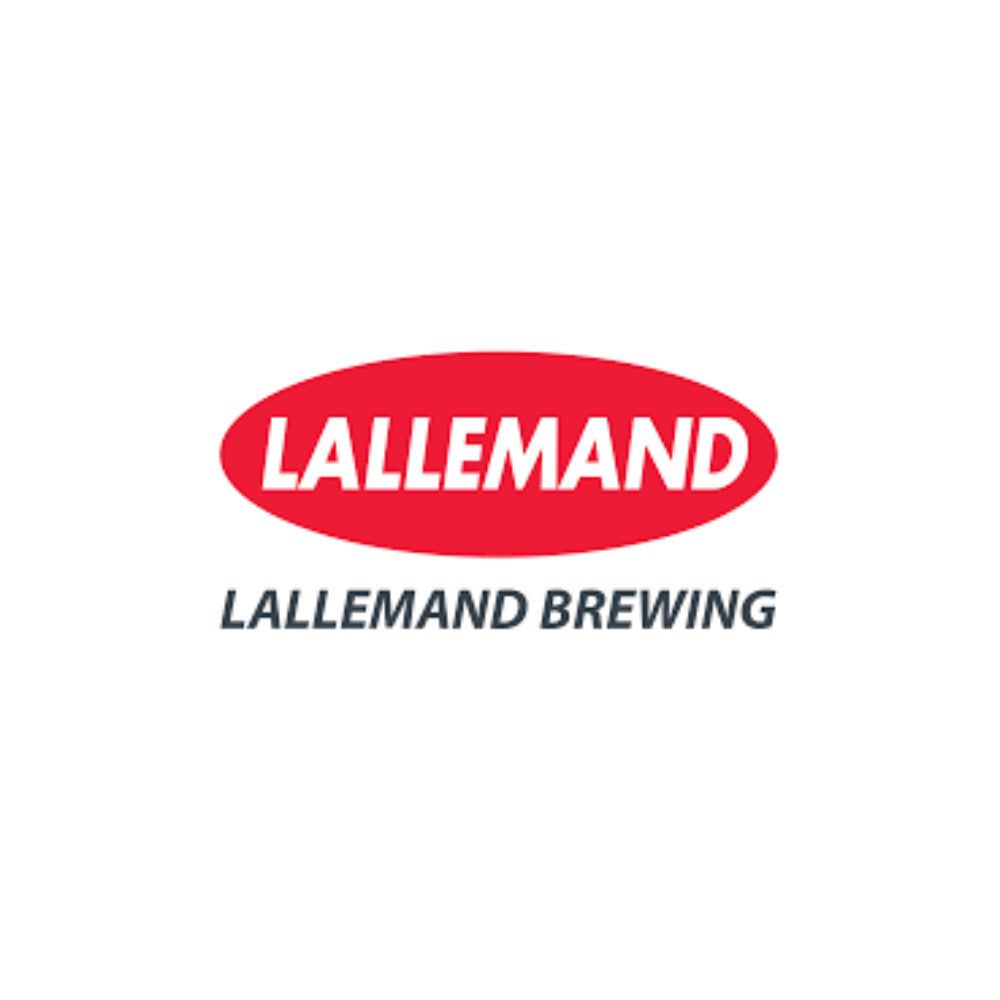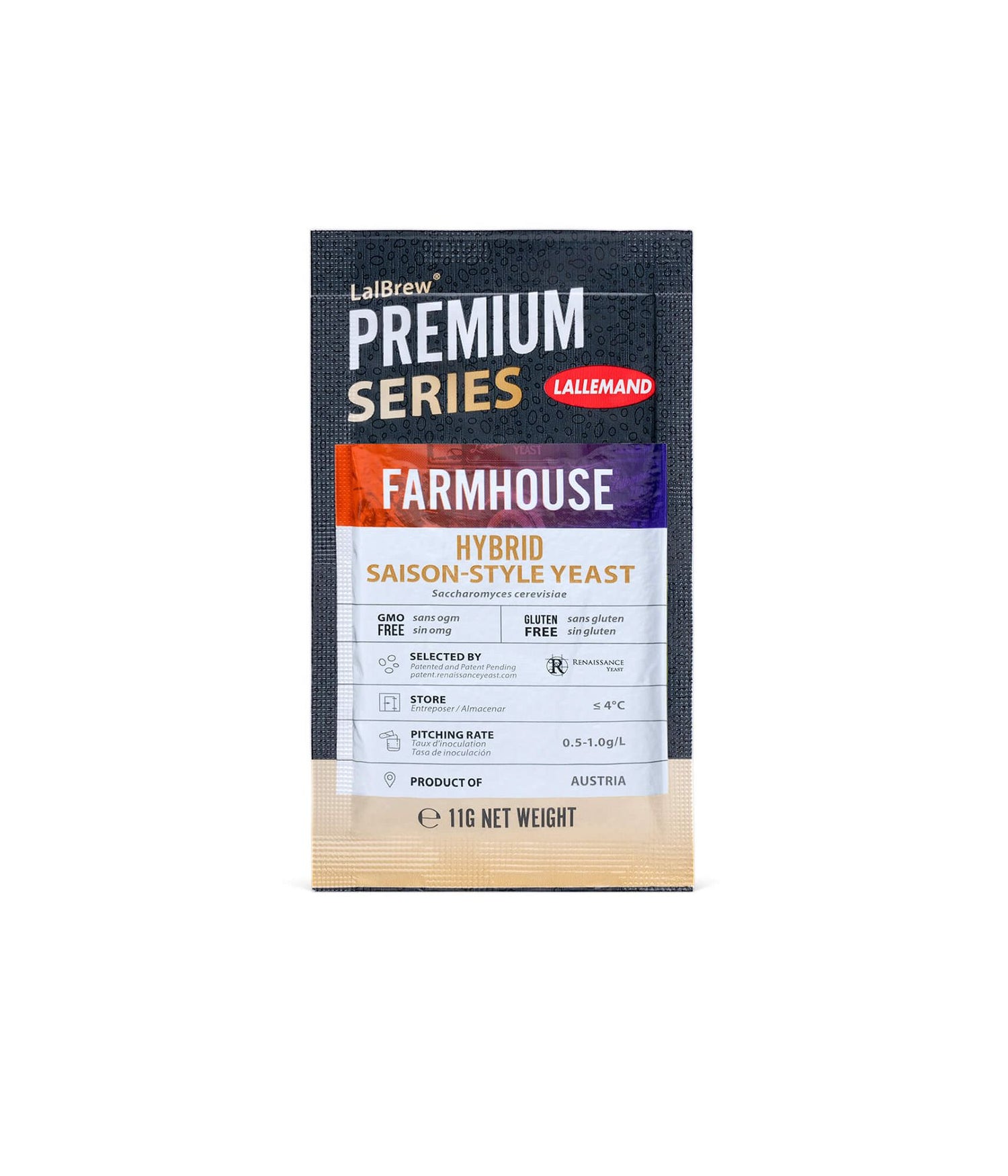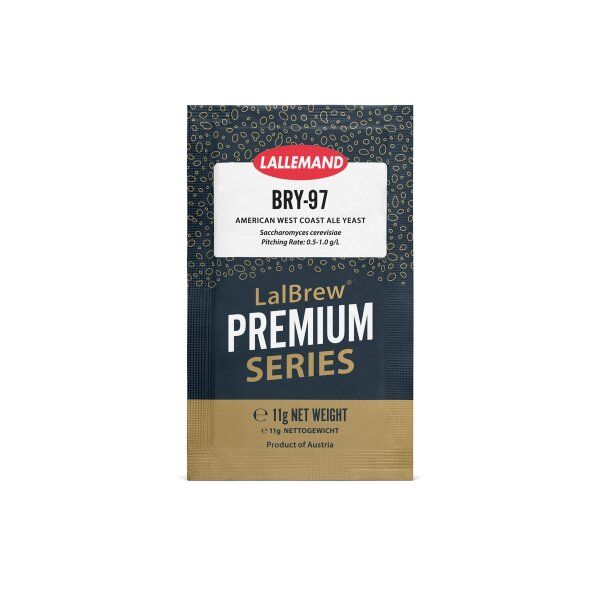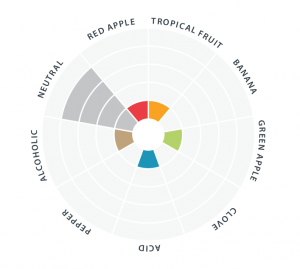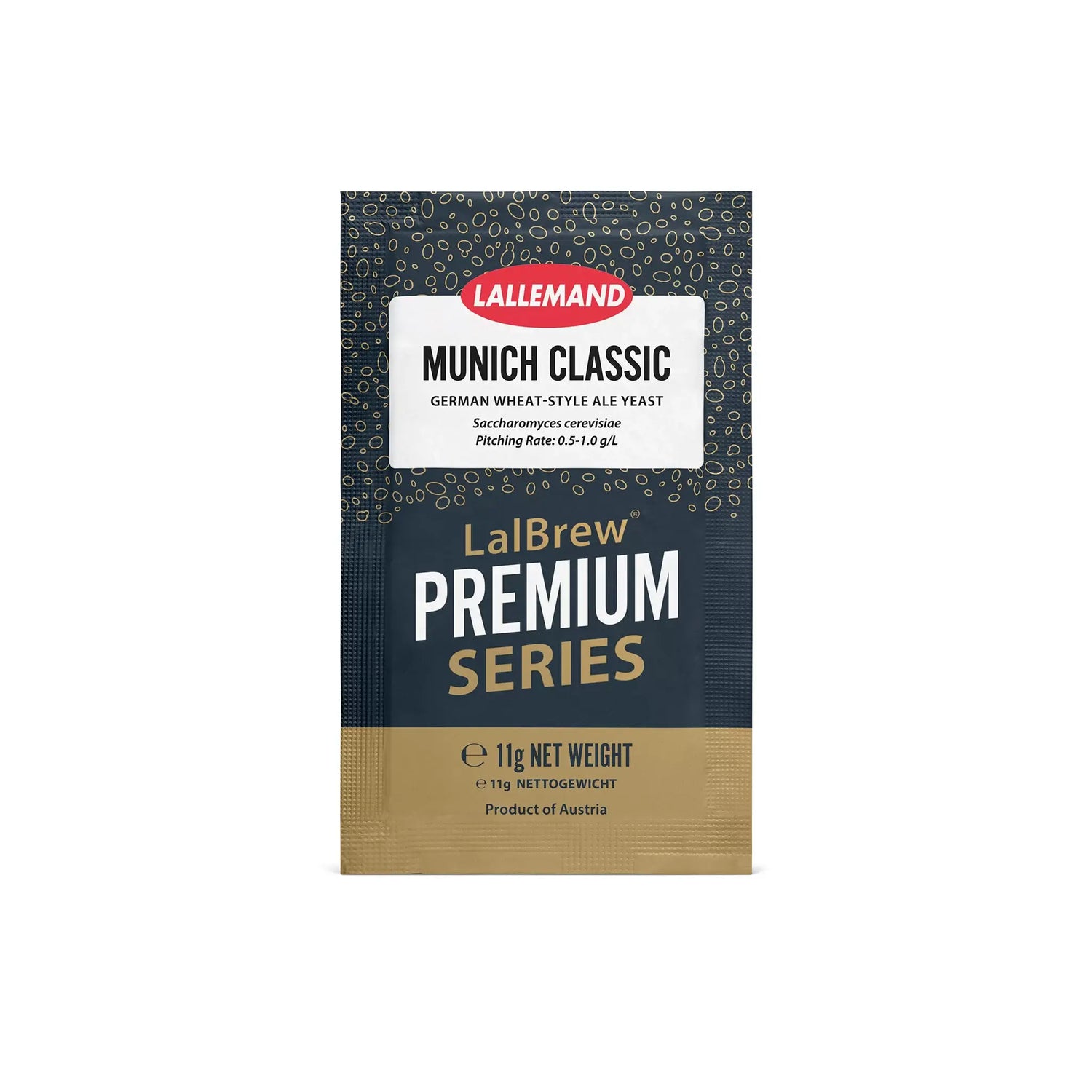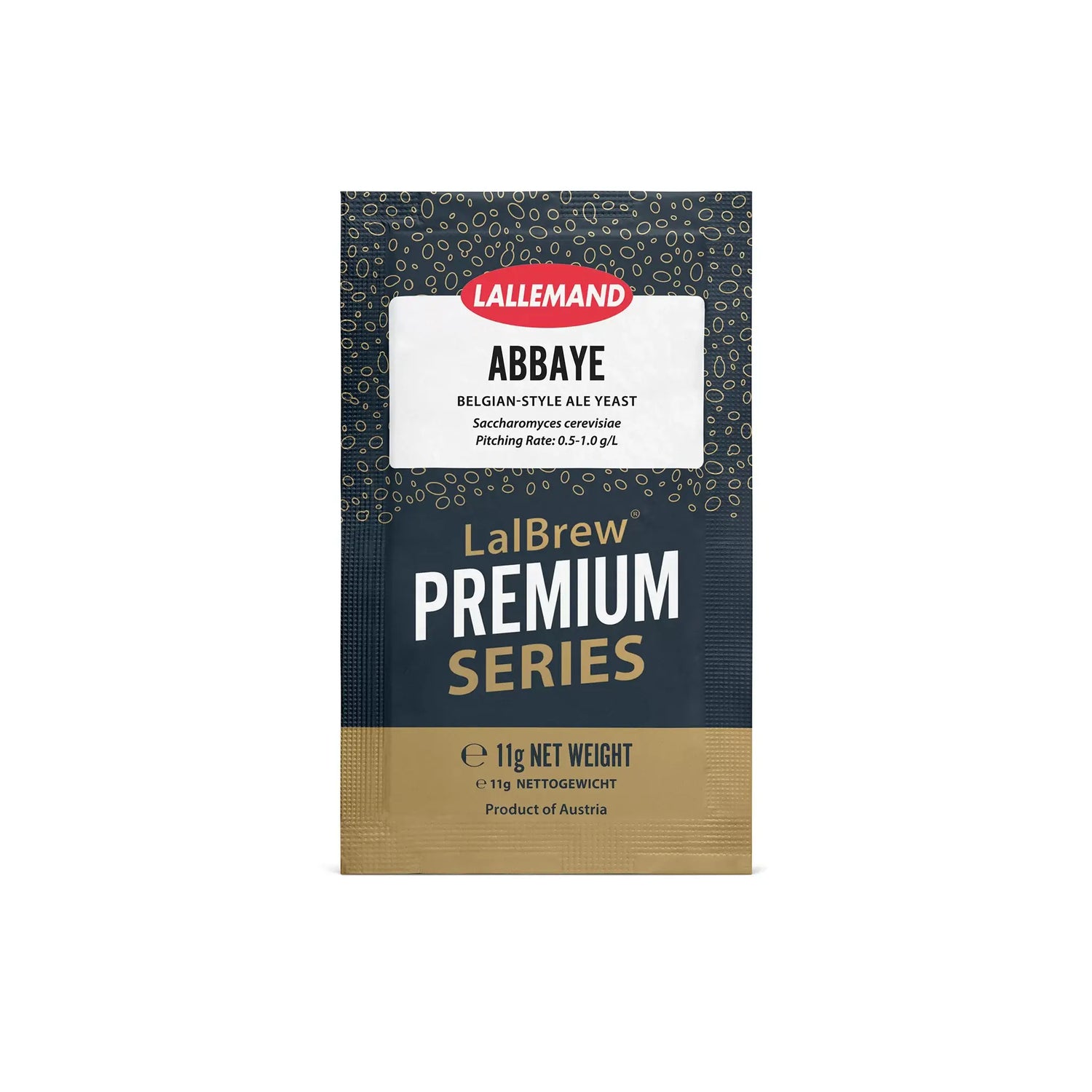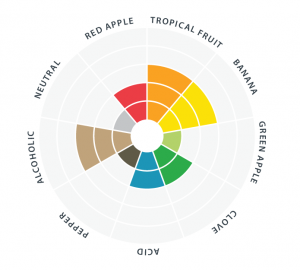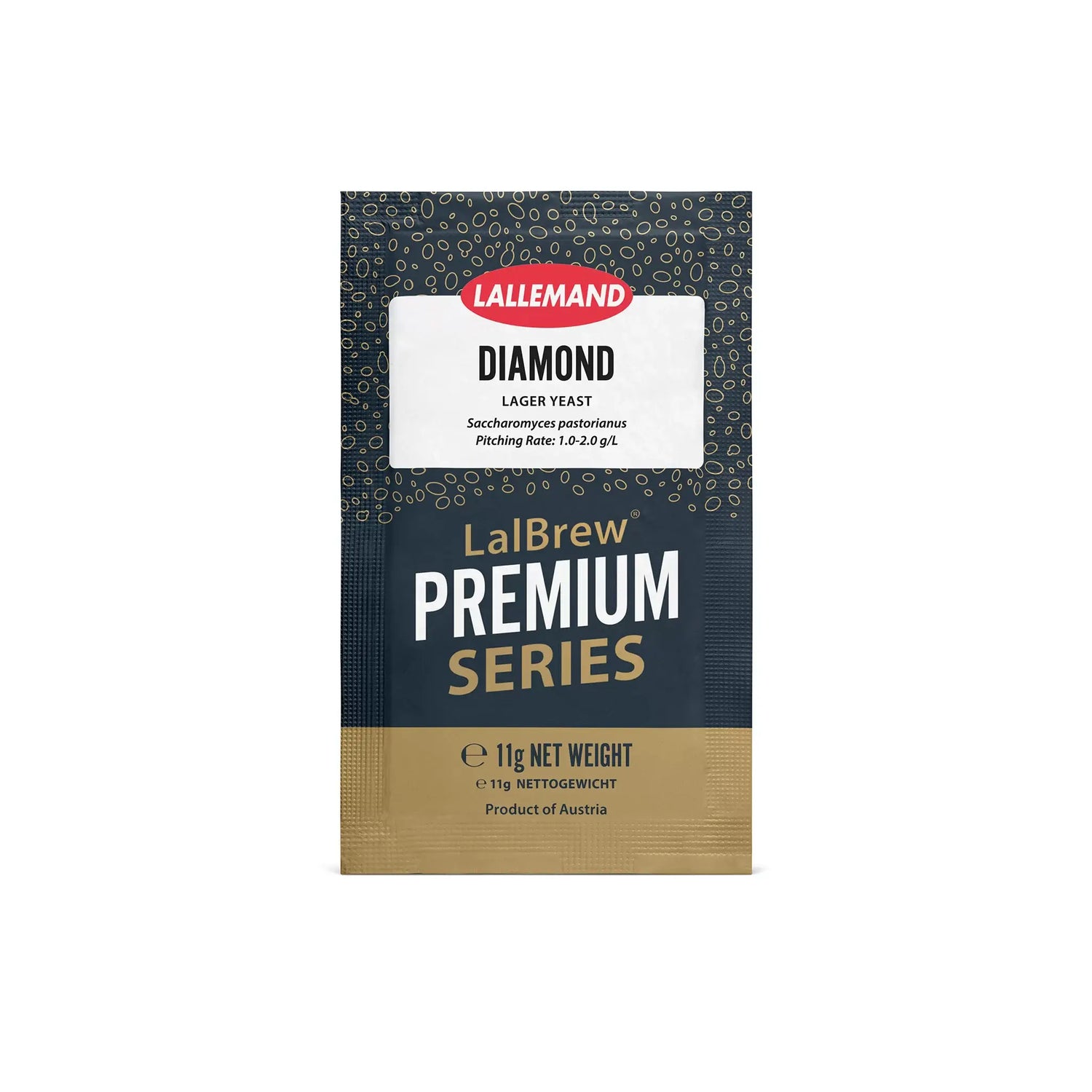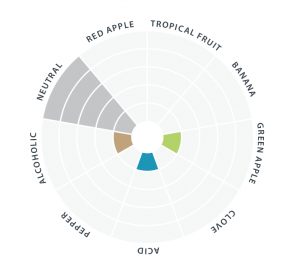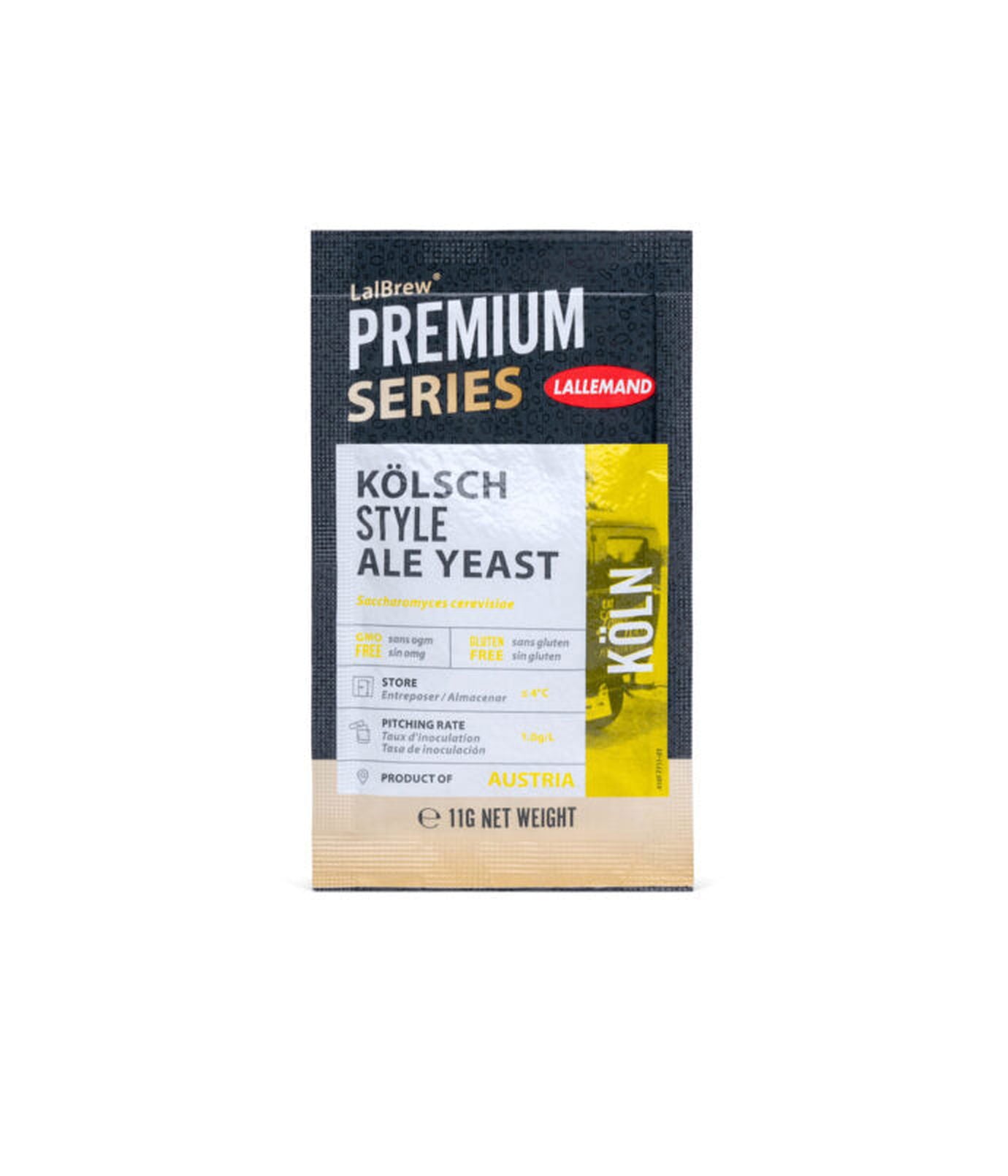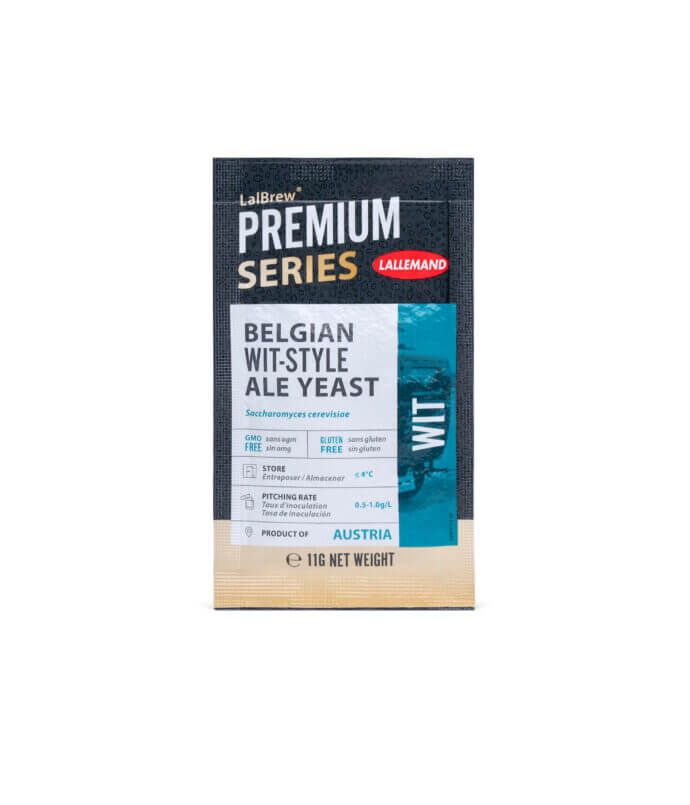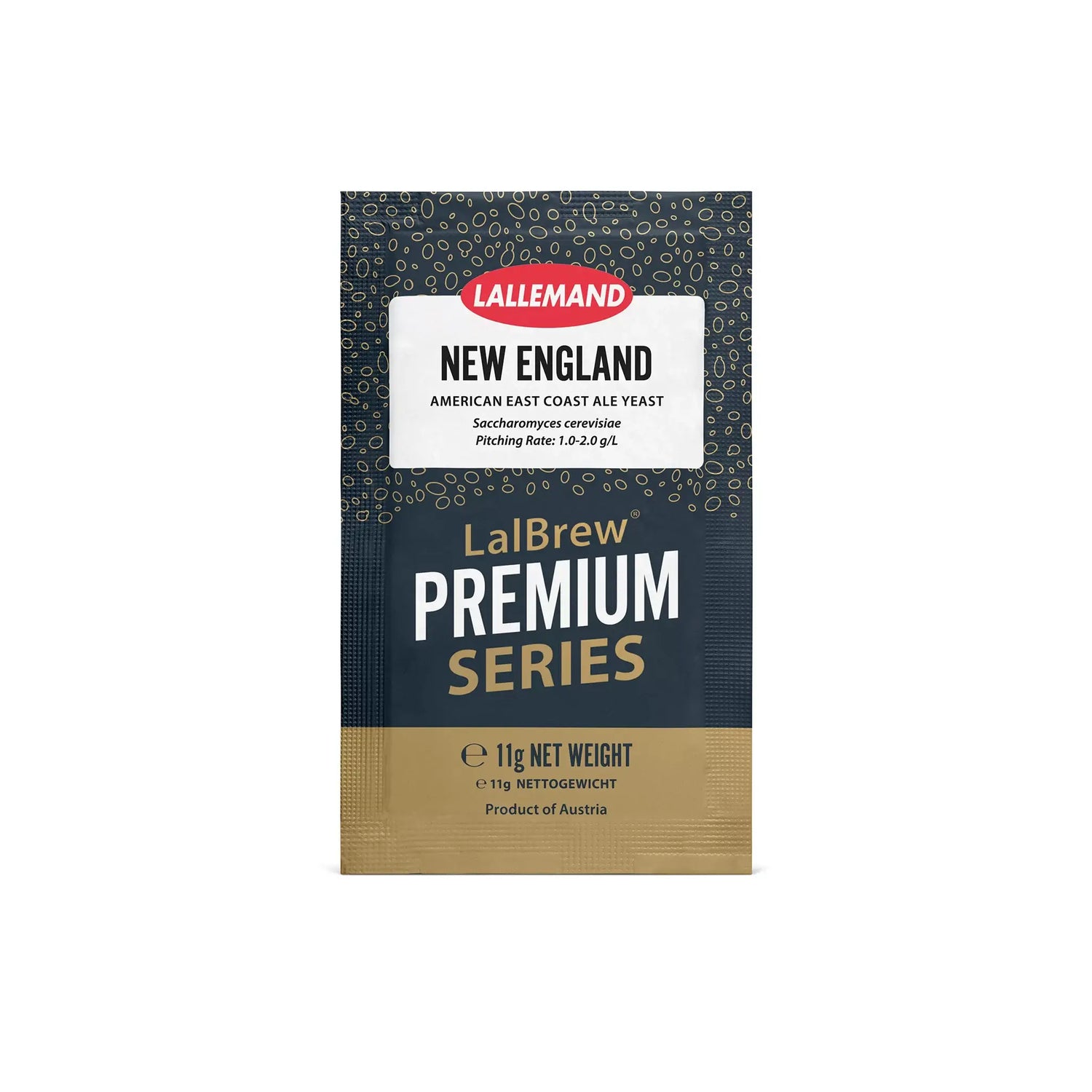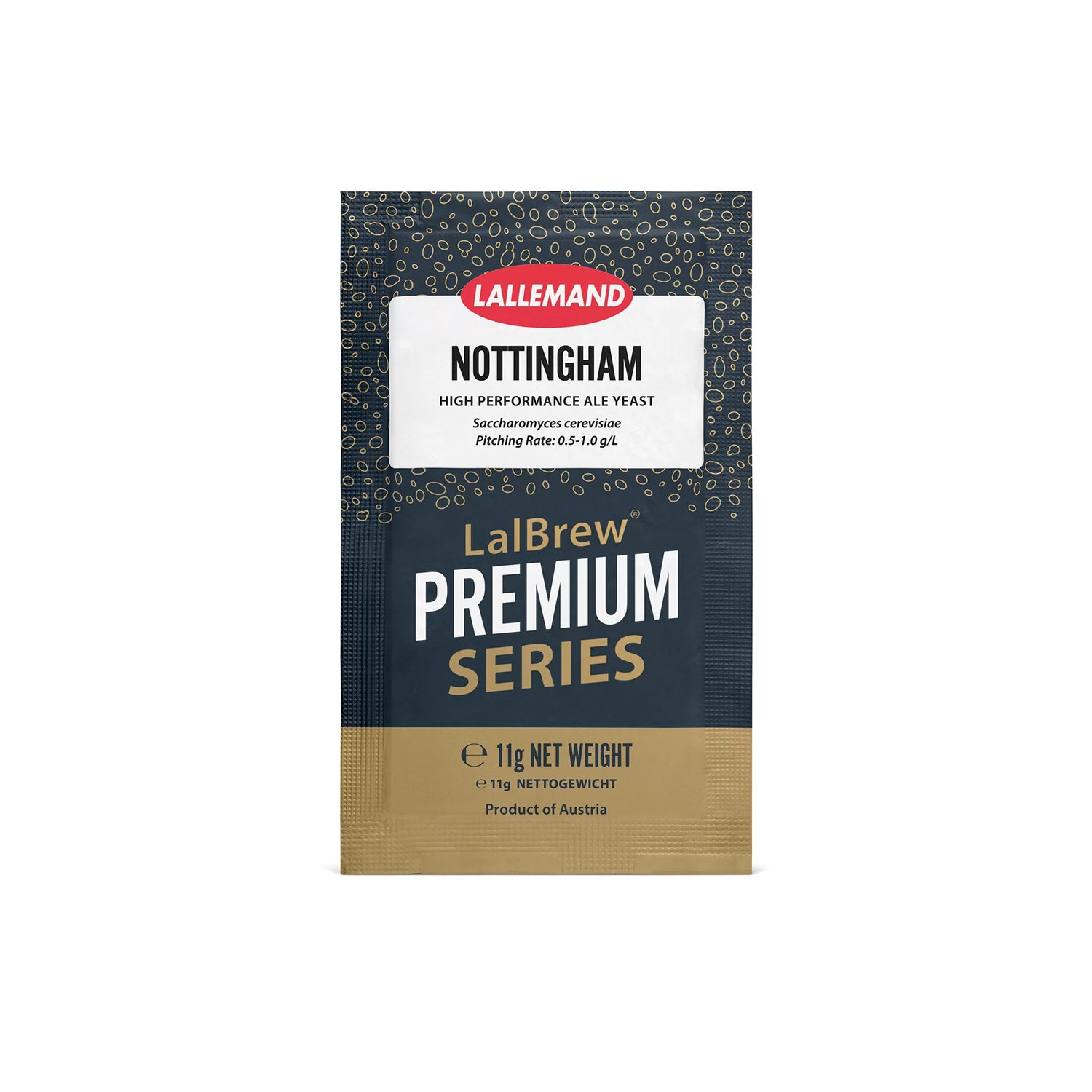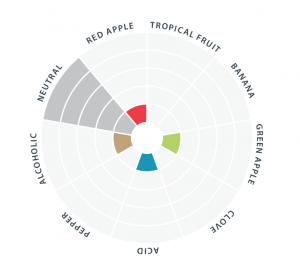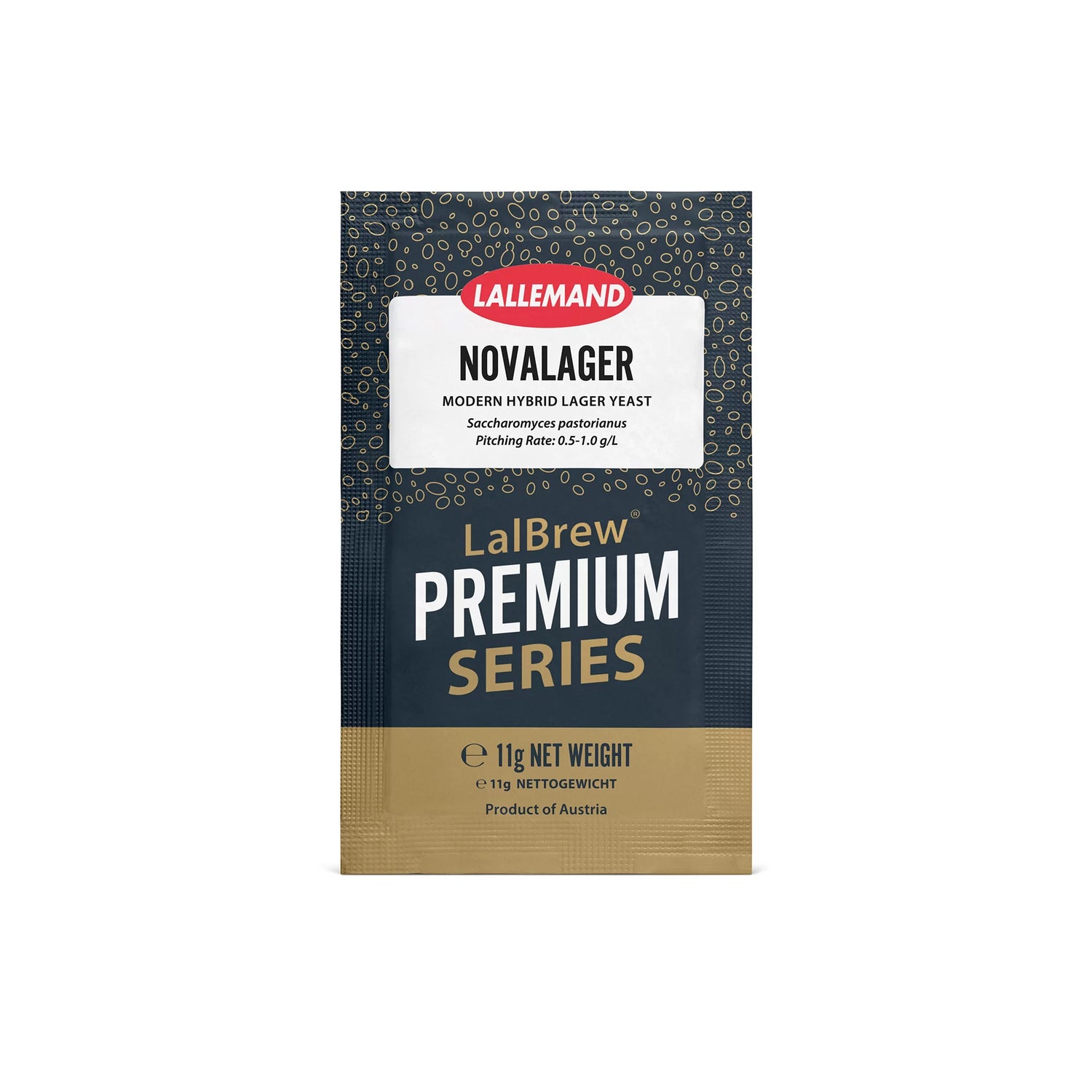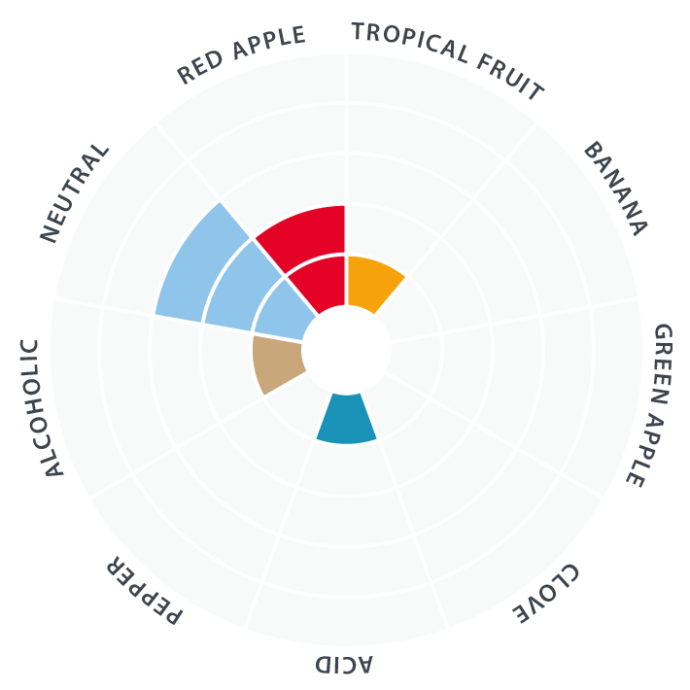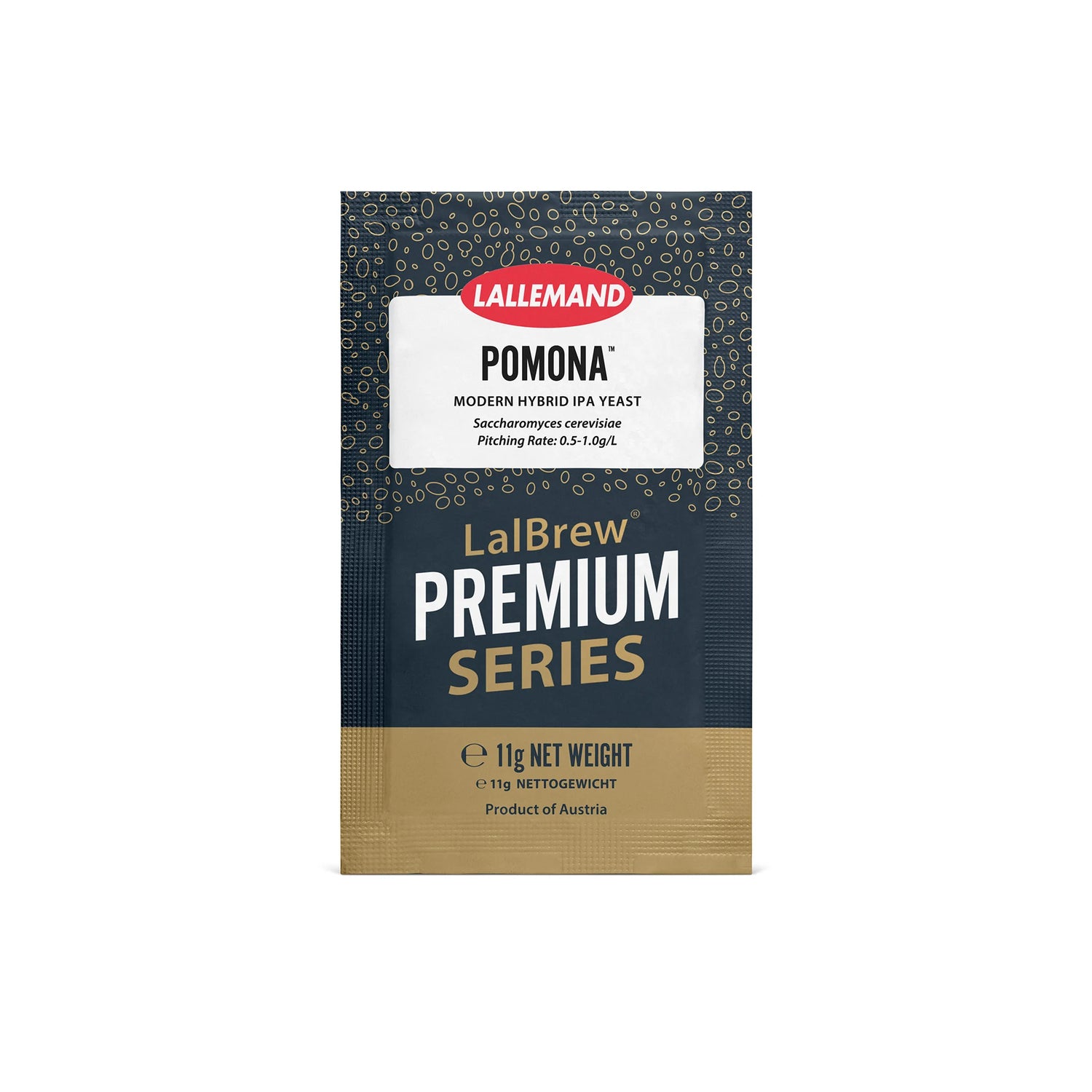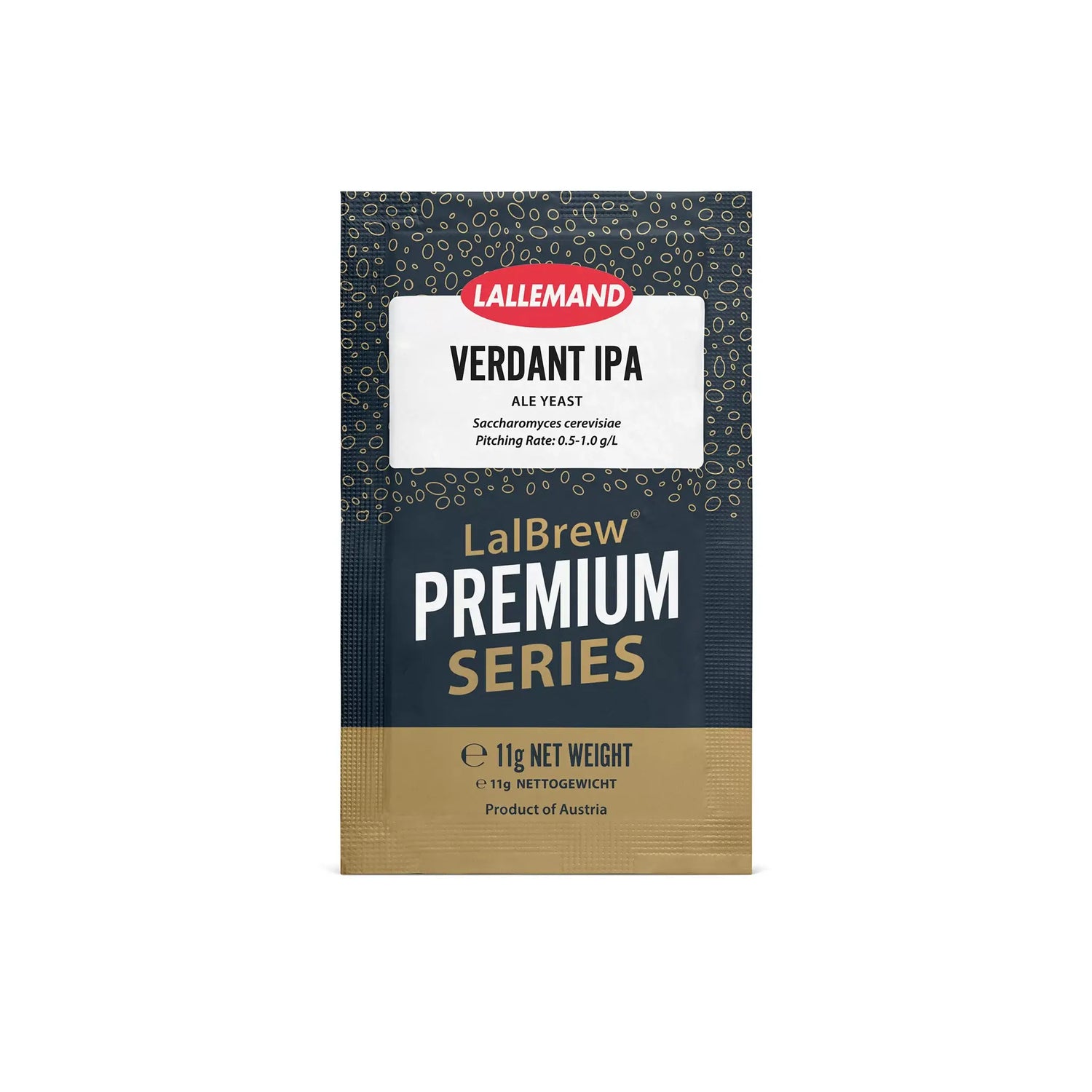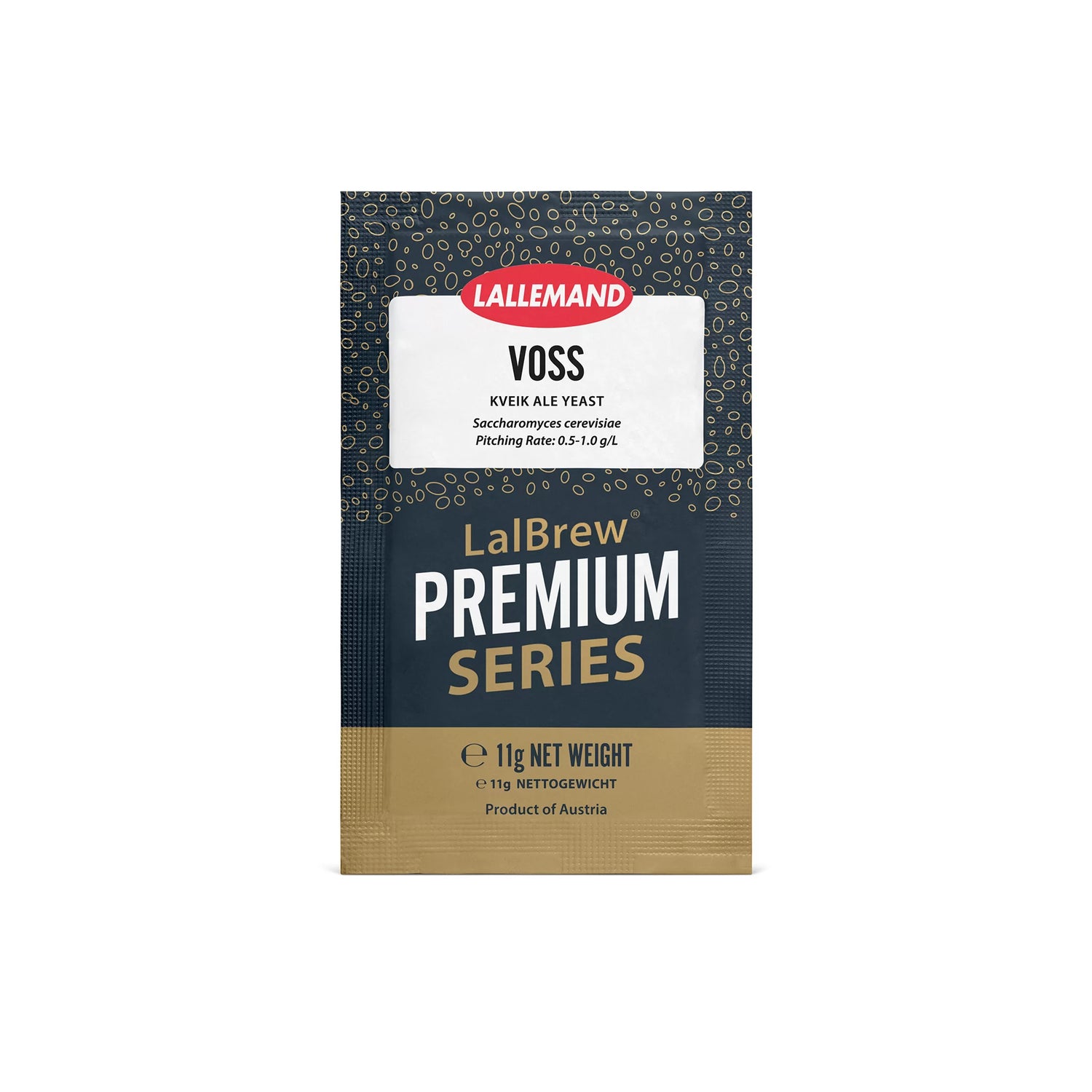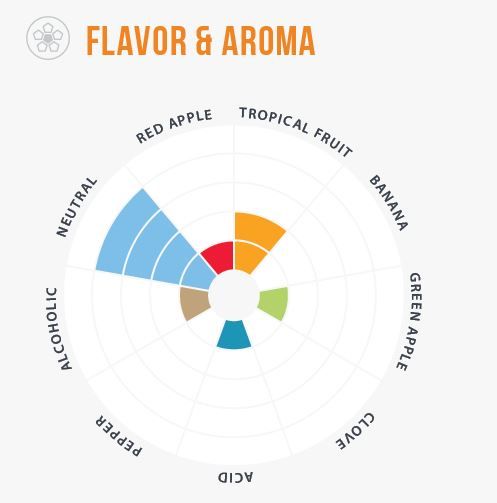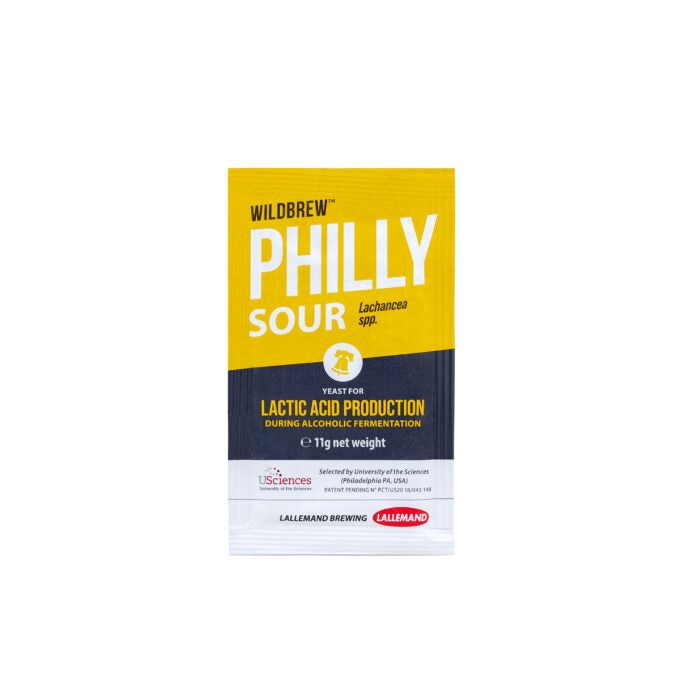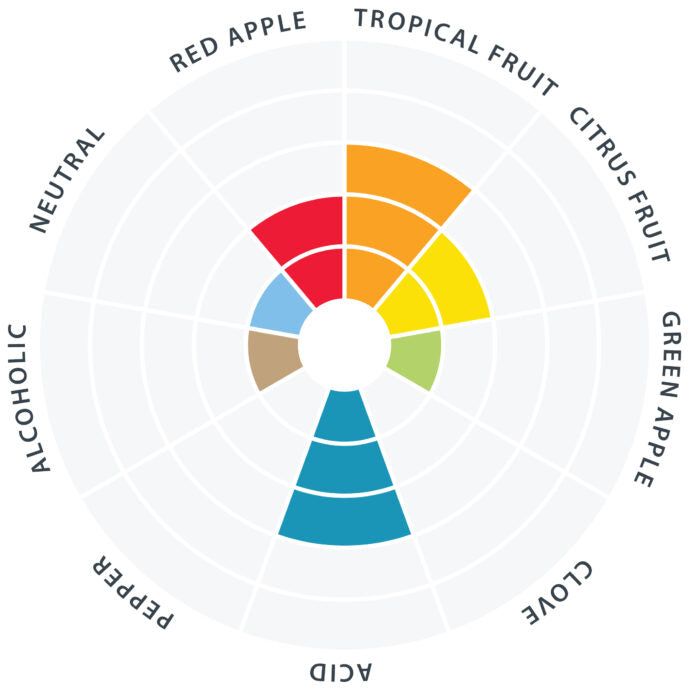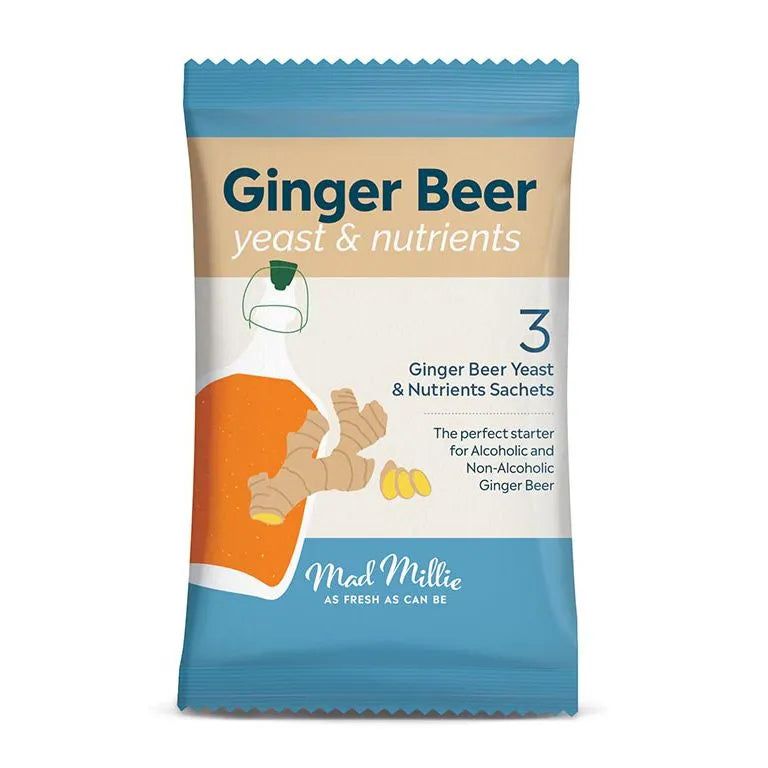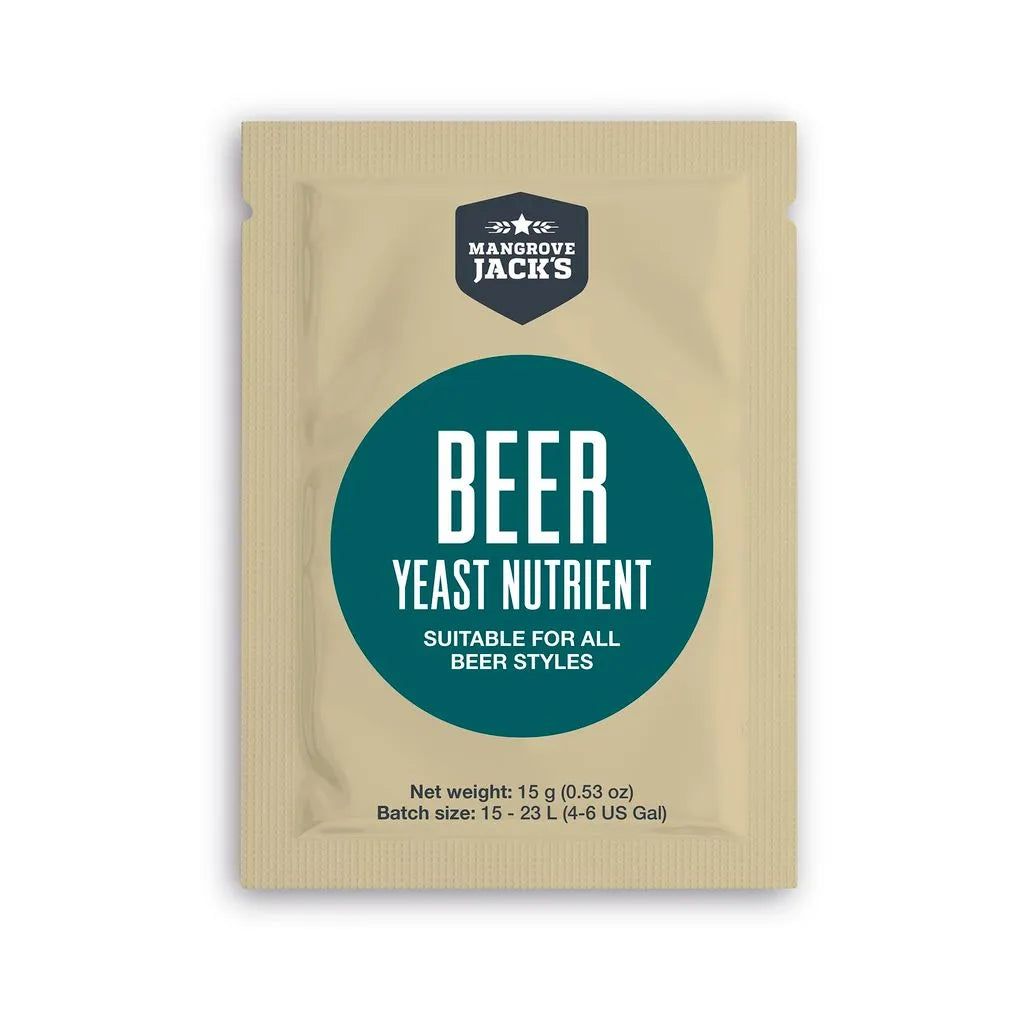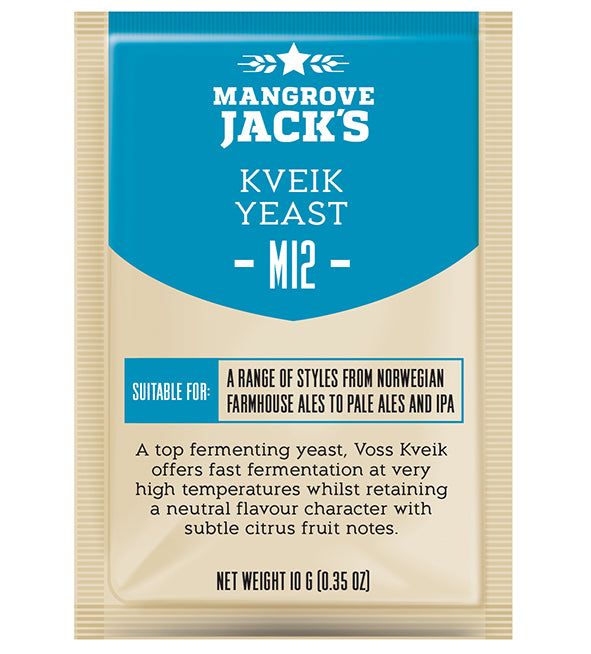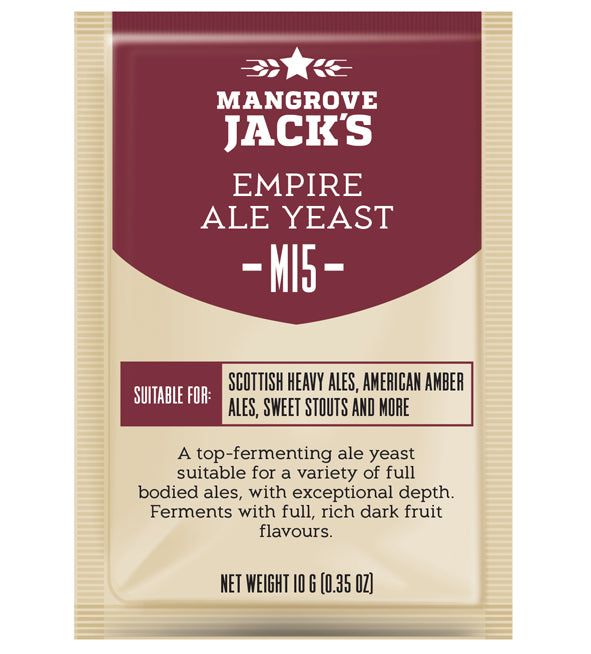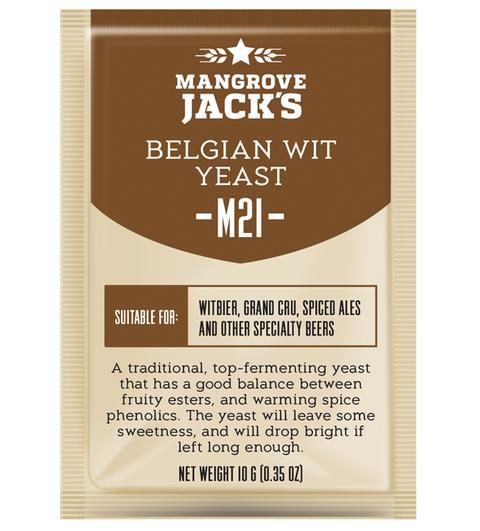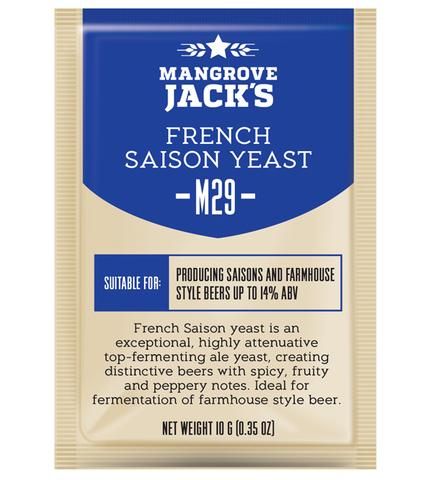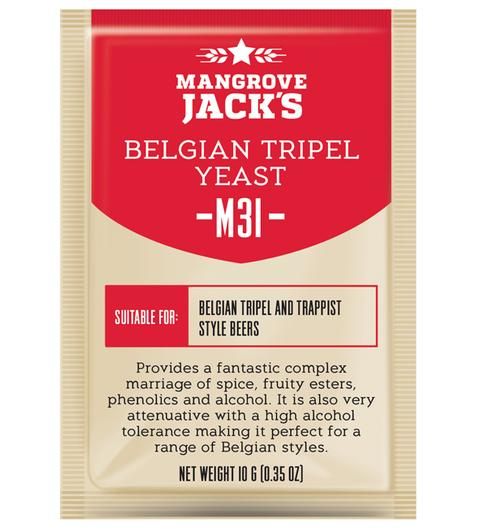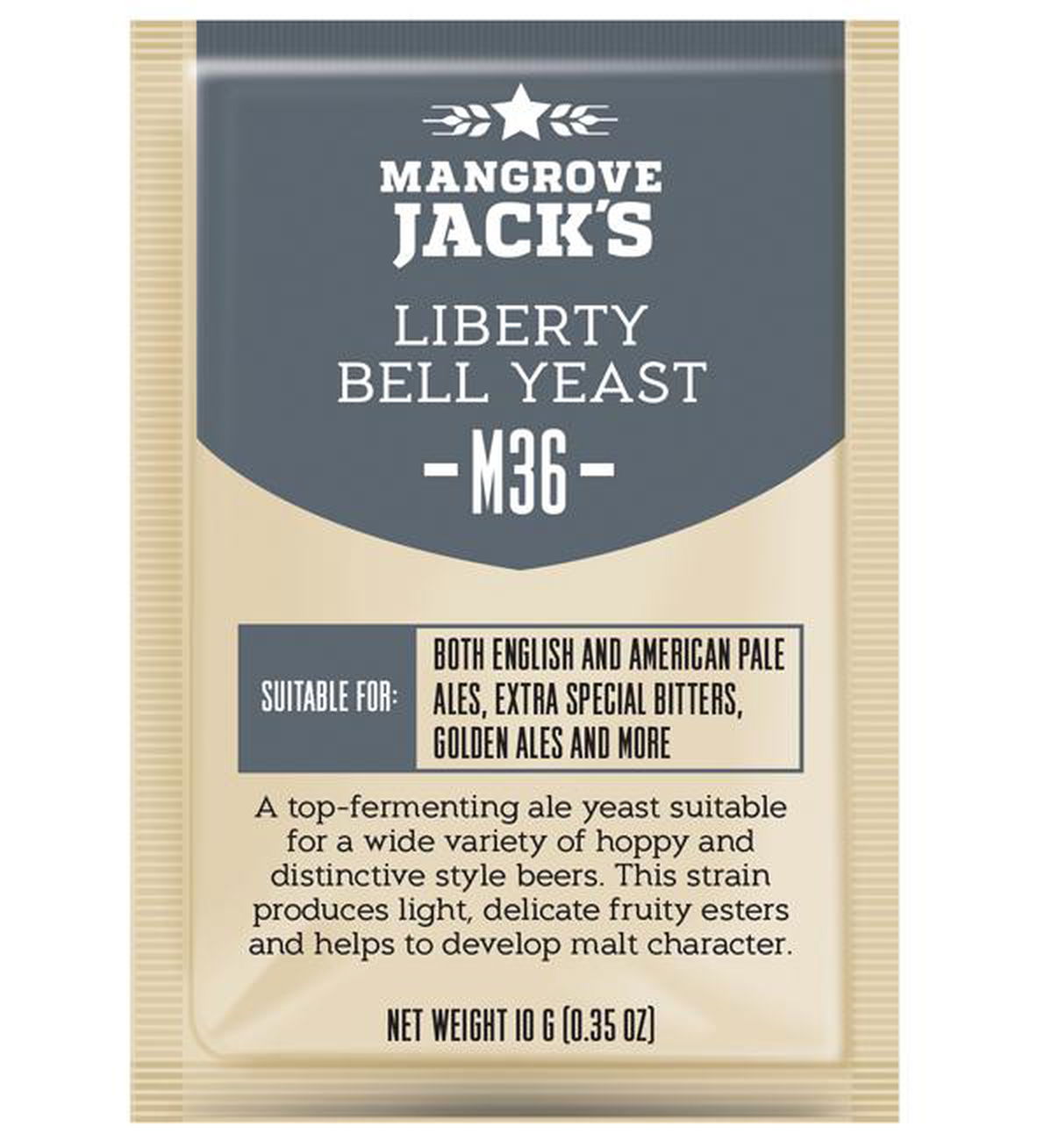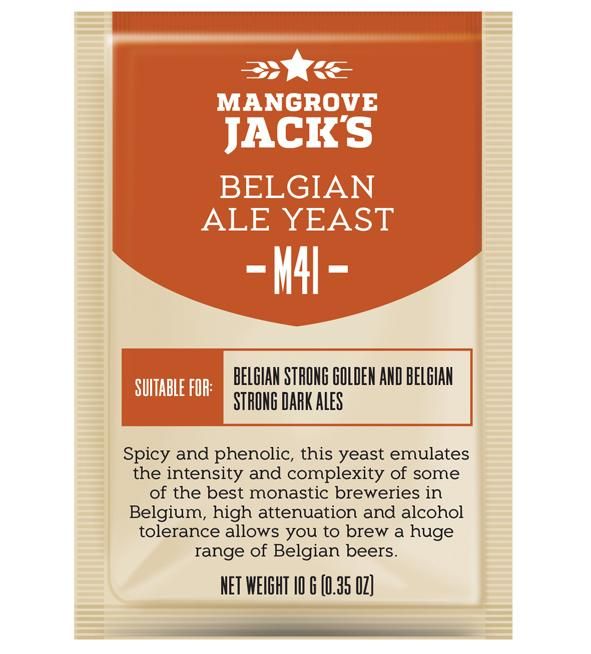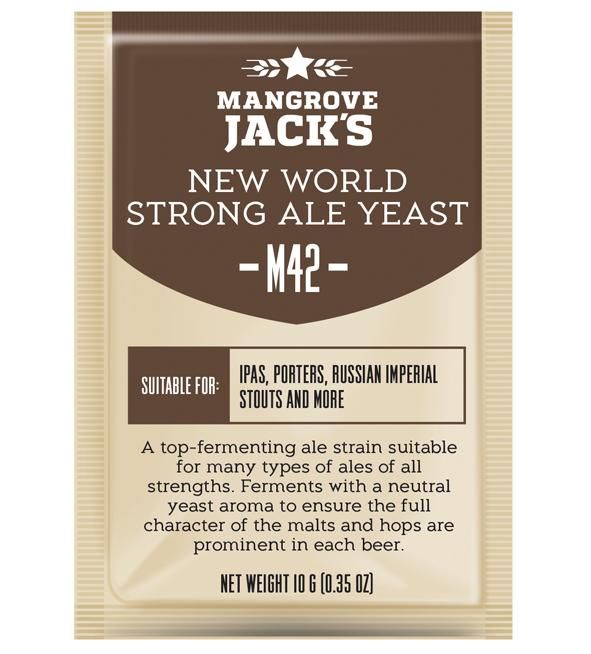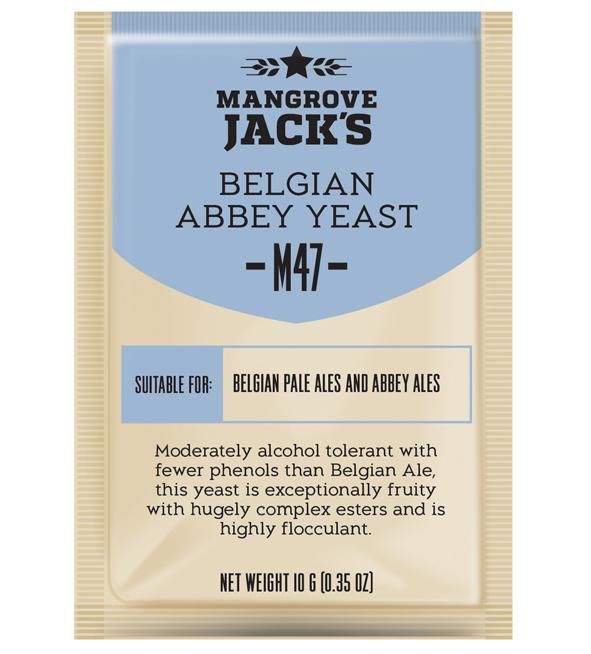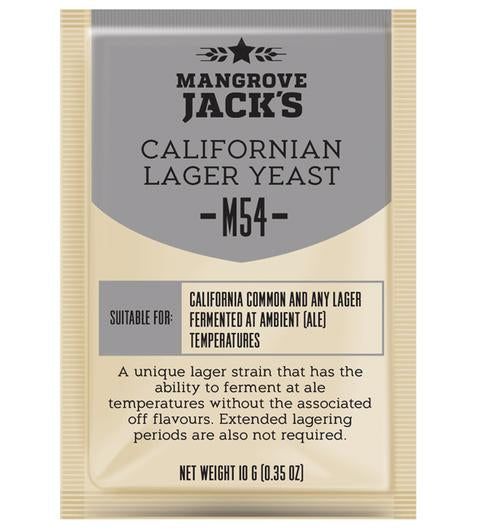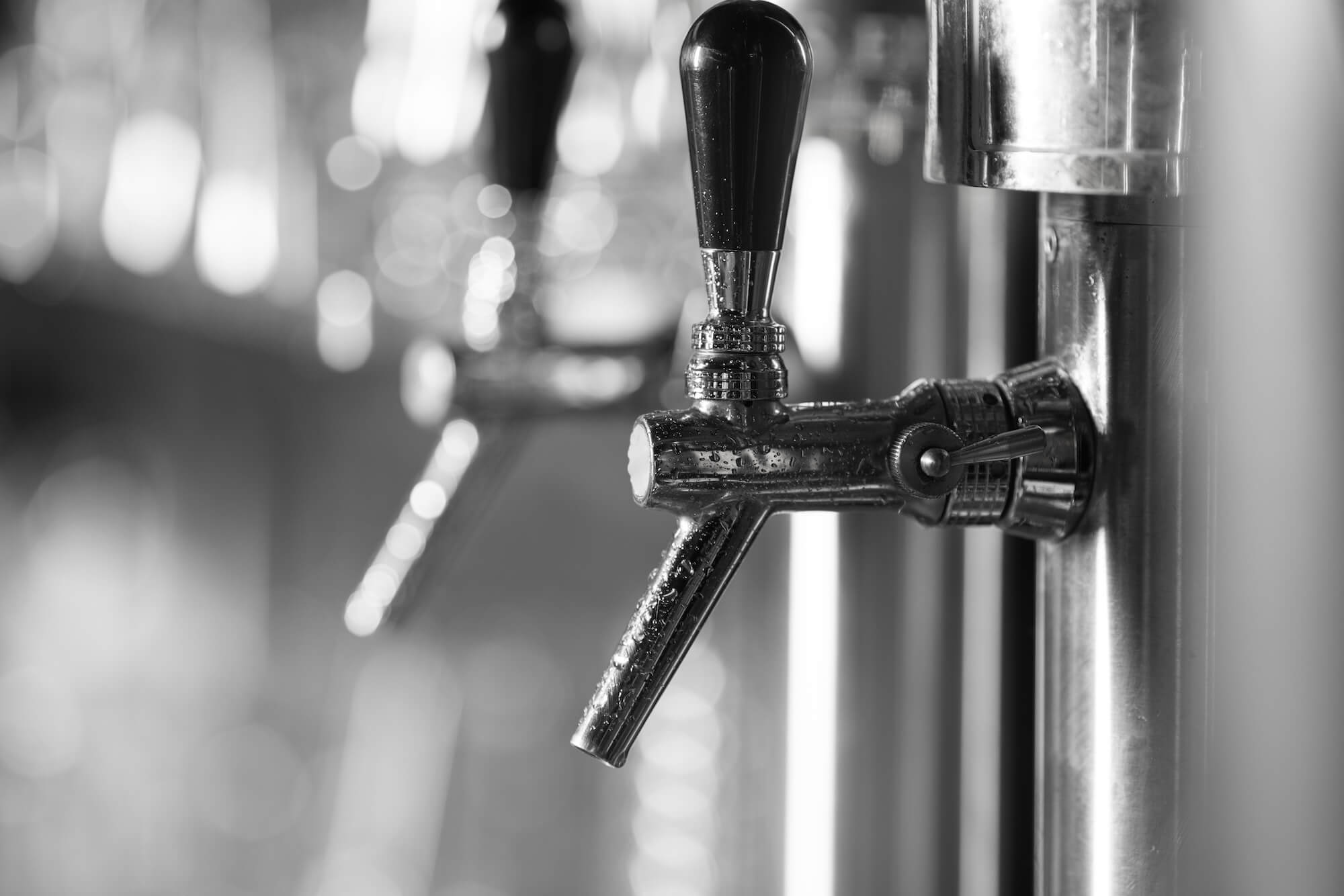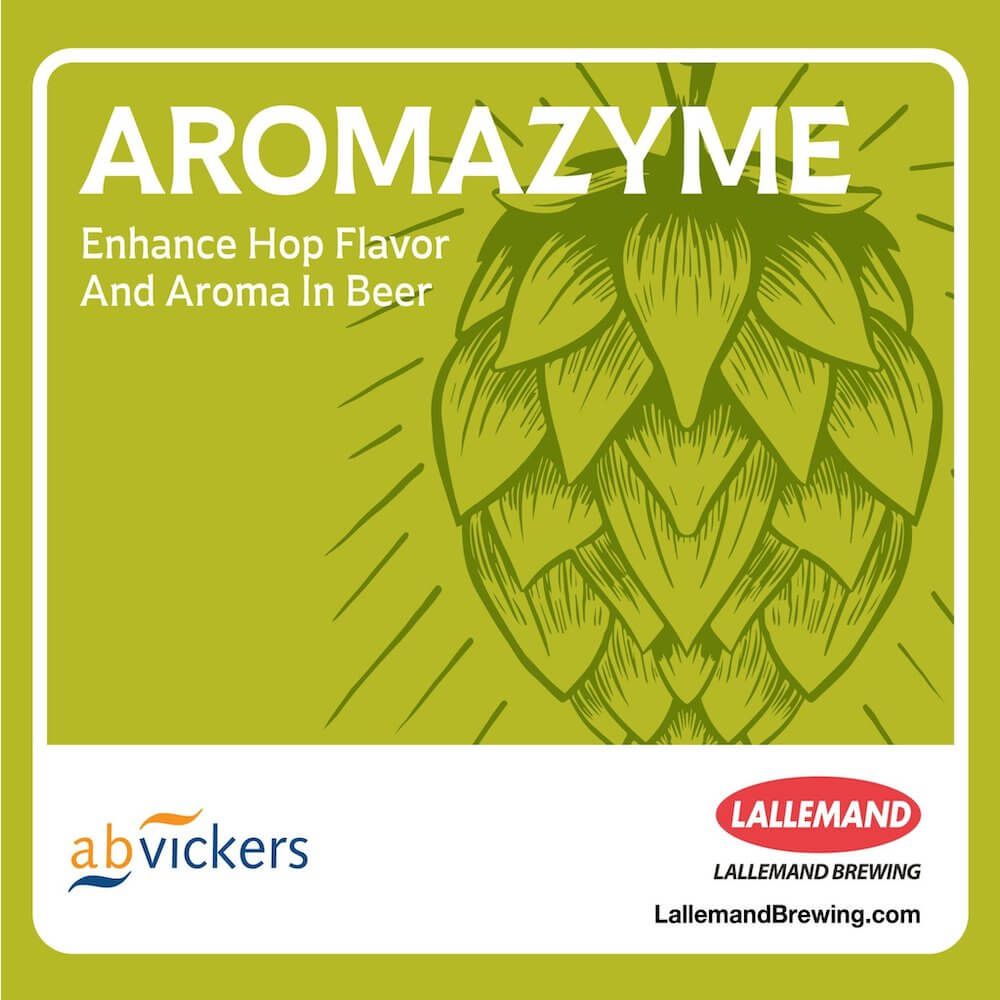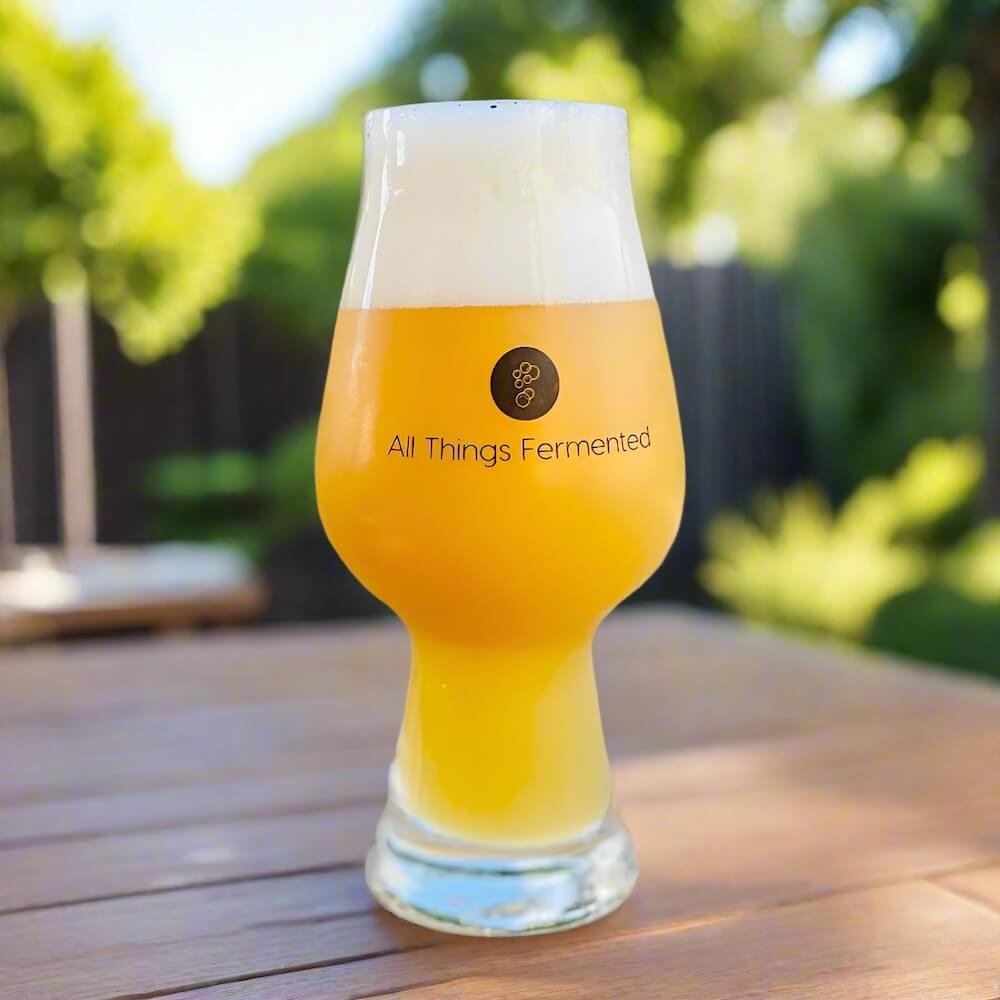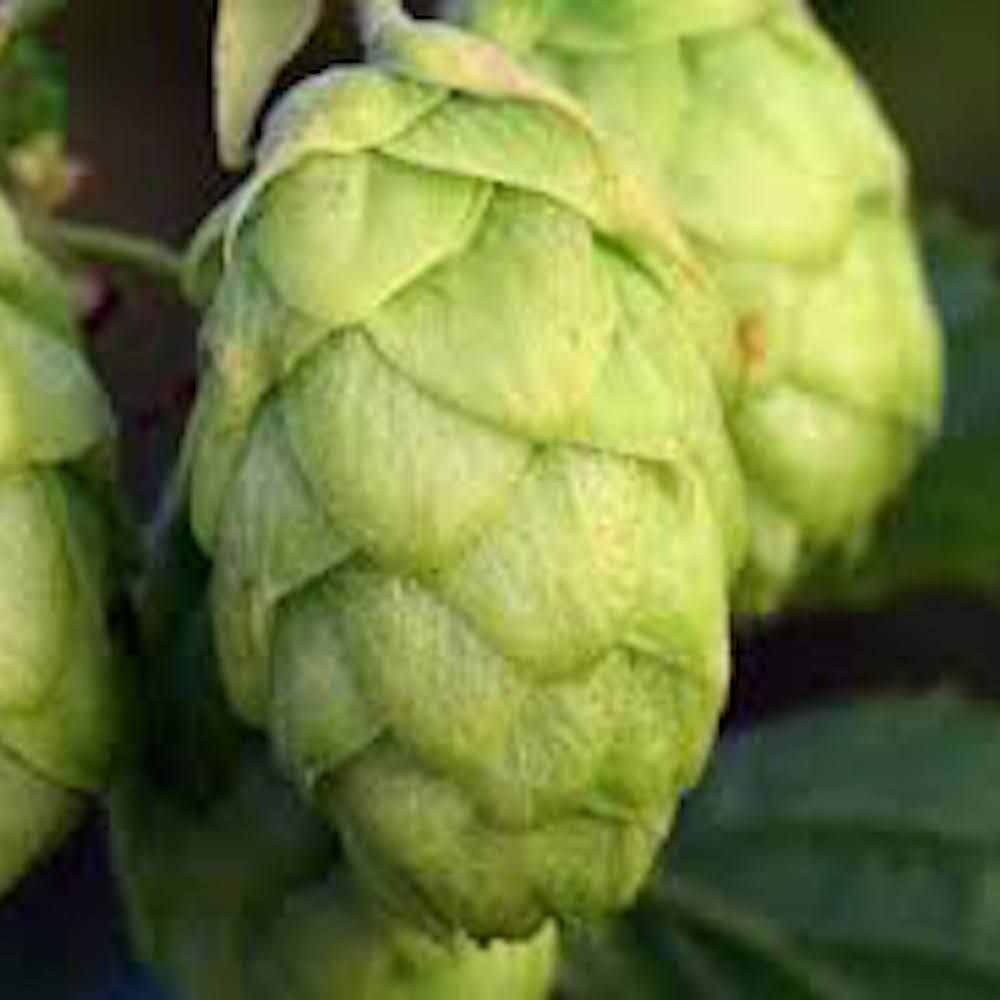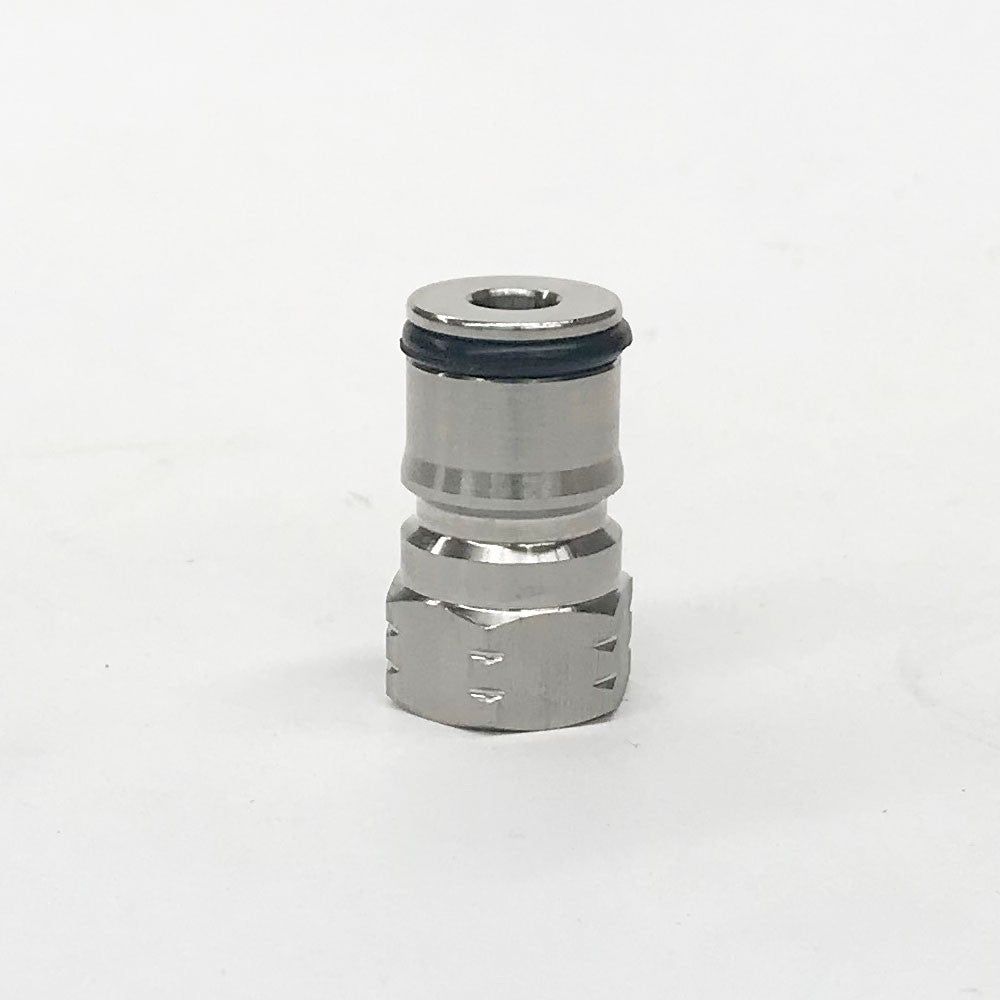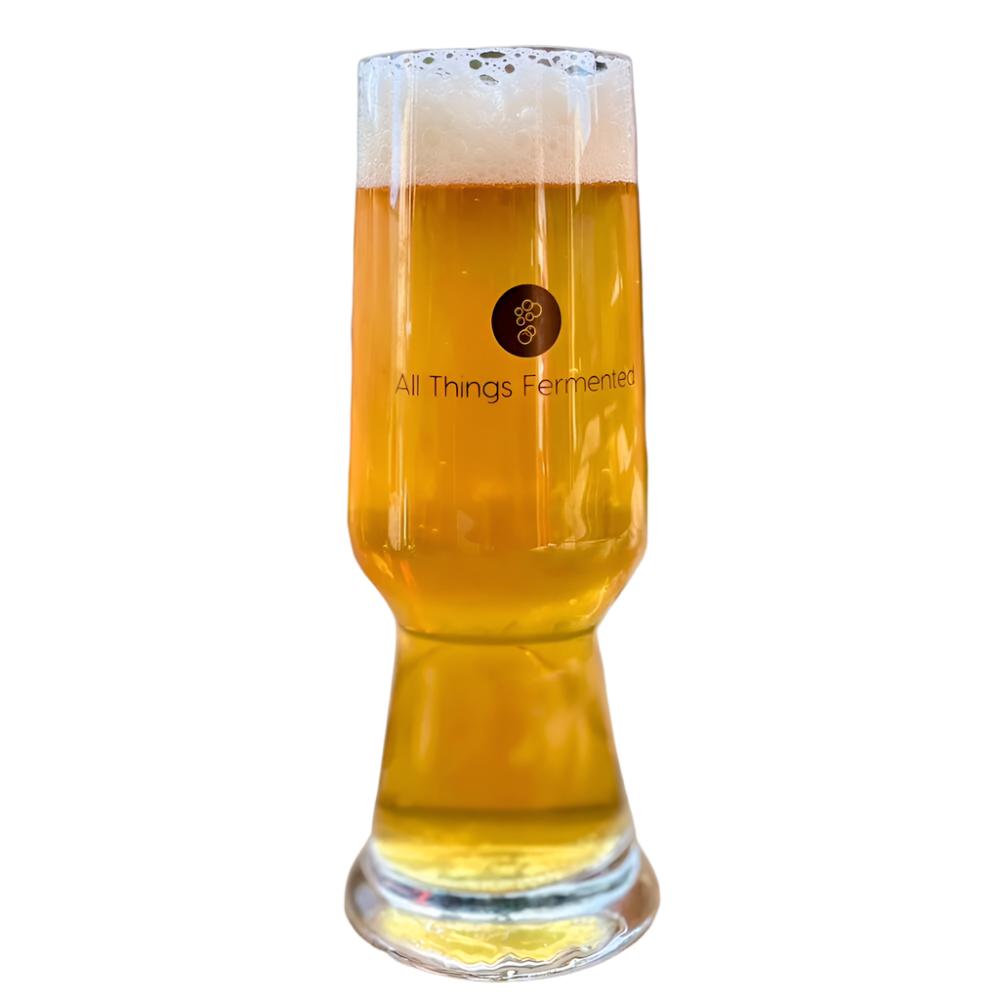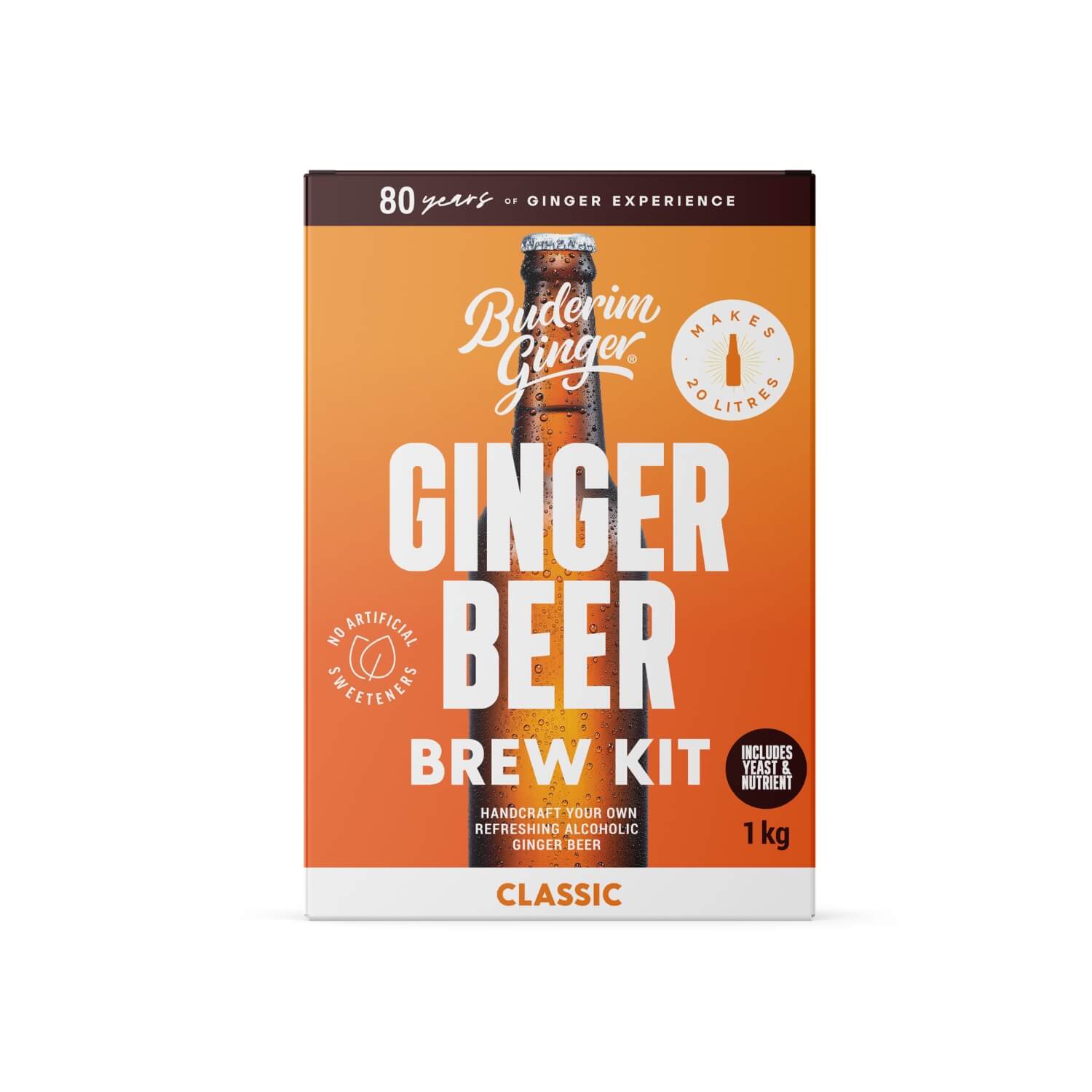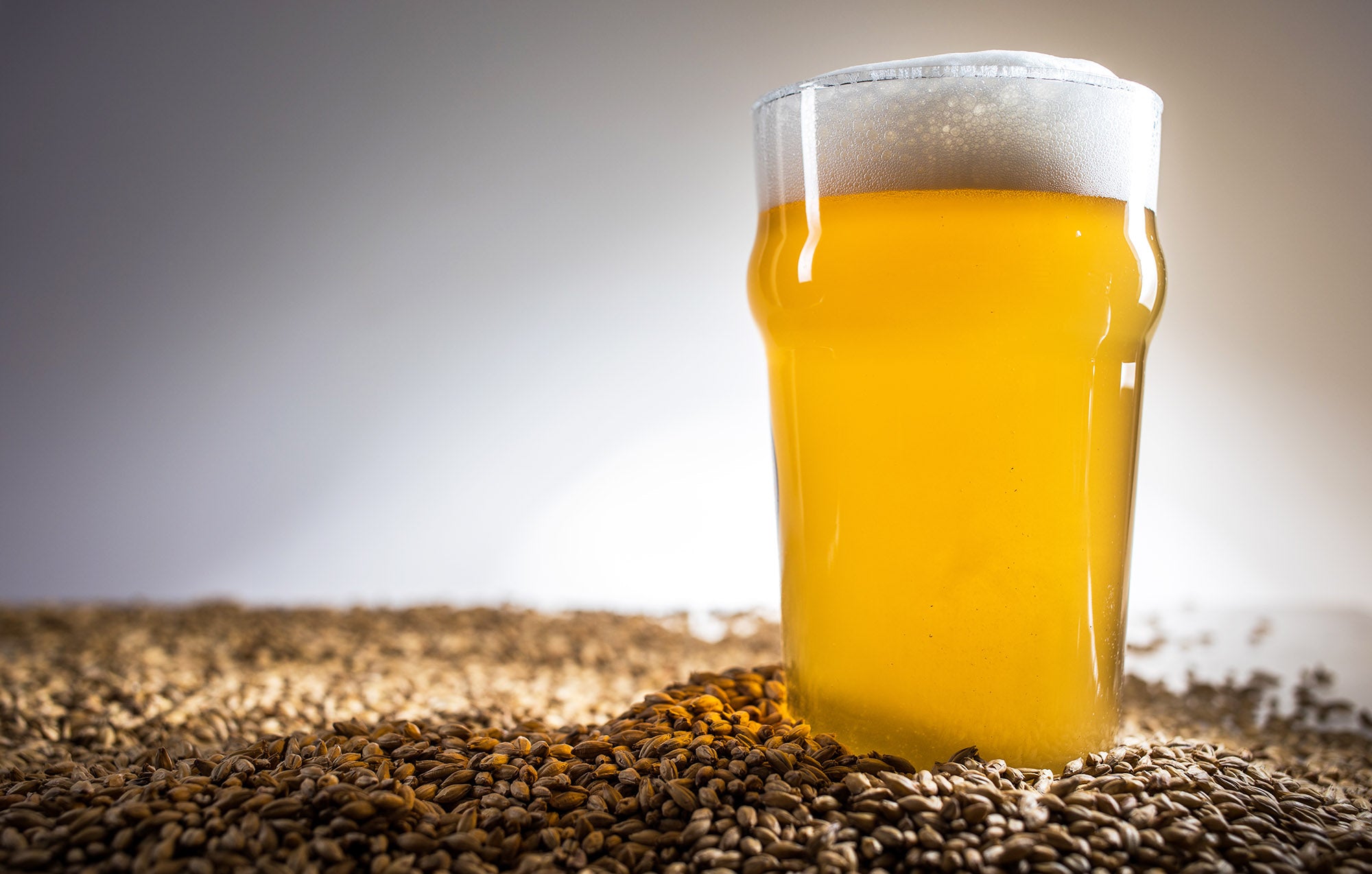Yeast is what makes beer.
There are many different yeast strains available to produce a wide range of different beer styles.
At All Things Fermented we stock a wide range of high quality brewing yeast from Froth Tech, Mangrove Jack's, Fermentis, and Lallemand.
Sort by:
ABV Aromazyme is a food-grade enzyme preparation with a strong glycosidase activity that enables biotransformation to occur during fermentation creating a range of potentially bold new primarily fruity flavours. Biotransformation is particularly sought after when brewing NEIPA (hazy) beers.
With a dosage rate of 0.05g/L, this vacuum sealed pouch containing 1.2g of Aromazyme is sufficient to dose 23L - 24L of beer.
For Optimal Results
When using ABV AROMAZYME, the following factors should be considered: Dry-hopping early in fermentation will result in greater extraction of terpene glycosides. Add the enzyme mid-fermentation to allow time for the enzyme to break down glycosides and the actively fermenting yeast to consume the glucose released from the reaction, while minimising volatile loss from CO2 stripping. Avoid adding enzyme after filtration.
Benefits
- Increases the diversity of hop flavours and aroma by changing the ratio
of specific terpene compounds - Enhances the beer mouthfeel and drinkability by reducing unpleasant harsh bitterness
- Slightly increases wort fermentability
- Expresses more character from less sophisticated hop varieties
Dosage Rate & Application
- The recommended dosage is 5g/hL (0.05g/L).
- ABV AROMAZYME has optimal activity between pH 3.5-6.5, although lower activity is still observed at pH 3.0 for use in sour beers. The optimal temperature range is 15-65ºC.
- Dilute the enzyme in an adequate amount of water (~ 1g in 10ml) to ensure even distribution within the fermenter.
Click here for the technical data sheet.
Attenuation: 72-80% | Flocculation: Medium | Alcohol Tolerance: 11% | Temp: 19-22°C
Assumed Origin: Sierra Nevada
One pouch of yeast is good for:
-
23L of wort up to 1.048 or
-
20L of wort up to 1.060
Contains more than 200B yeast cells. For Lagers or high gravity ales use two pouches or make a starter.
How To:
- Refrigerate until ready to use.
- Massage pouch contents to mix into consistent slurry.
- Sanitise the outside of the pouch.
- Tear open pouch and pitch your yeast into well aerated wort at the desired temp.
Swelling of the pack is not an indication of a problem with the yeast. The yeast is still perfectly fine to use (assuming it is within date and has been stored properly). We store all of our Froth Yeast in the fridge between 2℃ - 4℃ and include an ice pack with each order to keep the yeast cold whilst in transit.
Here is a great article from Omega Yeast that explains what causes yeast pouches to swell and why it is not something to be concerned with in and of itself.
Includes an ice pack for shipping at no additional cost to keep your yeast cool during transit. Refrigerate as soon as you receive your order.
Attenuation: 73-79% | Flocculation: Medium | Alcohol Tolerance: 10% | Temp: 9-13°C
Assumed Origin: Weinhenstephan
One pouch of yeast is good for:
-
23L of wort up to 1.048 or
-
20L of wort up to 1.060
Contains more than 200B yeast cells. For Lagers or high gravity ales use two pouches or make a starter.
How To:
- Refrigerate until ready to use.
- Massage pouch contents to mix into consistent slurry.
- Sanitise the outside of the pouch.
- Tear open pouch and pitch your yeast into well aerated wort at the desired temp.
Swelling of the pack is not an indication of a problem with the yeast. The yeast is still perfectly fine to use (assuming it is within date and has been stored properly). We store all of our Froth Yeast in the fridge between 2℃ - 4℃ and include an ice pack with each order to keep the yeast cold whilst in transit.
Here is a great article from Omega Yeast that explains what causes yeast pouches to swell and why it is not something to be concerned with in and of itself.
Includes an ice pack for shipping at no additional cost to keep your yeast cool during transit. Refrigerate as soon as you receive your order.
Named by Dale Gould as a salute to the UK Ska music scene, Rudeboy is a go-getter when it comes to bright ales - or fuller sweeter Hazies thanks to the lower attenuation . This boy is highly flocculant and rather clean, with a neutral profile that nudges mild malt and soft fruit aromatics to the forefront. Rudeboy scrubs up well bright in all sorts from ESBs and Milds, Dark & Amber ales, as well as new and old world IPAs, Pale Ales & Hazies.
Attenuation: 68-72% | Flocculation: High | Alcohol Tolerance: 9% | Temp: 18-22°C
Assumed Origin: Young’s Brewery
One pouch of yeast is good for:
-
23L of wort up to 1.048 or
-
20L of wort up to 1.060
Contains more than 200B yeast cells. For Lagers or high gravity ales use two pouches or make a starter.
How To:
- Refrigerate until ready to use.
- Massage pouch contents to mix into consistent slurry.
- Sanitise the outside of the pouch.
- Tear open pouch and pitch your yeast into well aerated wort at the desired temp.
Swelling of the pack is not an indication of a problem with the yeast. The yeast is still perfectly fine to use (assuming it is within date and has been stored properly). We store all of our Froth Yeast in the fridge between 2℃ - 4℃ and include an ice pack with each order to keep the yeast cold whilst in transit.
Here is a great article from Omega Yeast that explains what causes yeast pouches to swell and why it is not something to be concerned with in and of itself.
Includes an ice pack for shipping at no additional cost to keep your yeast cool during transit. Refrigerate as soon as you receive your order.
Explore the more delicate textures and indulge in a spectrum of radiant flavour & aroma. Spectra boasts a more robust attenuation capacity than many of its counterparts, while exhibiting an elegant ester profile and velvety mouthfeel. This prolific strain dances with hops & protein to offer a mesmerising glow in New England IPA’s, while its Old English origins make it a wise choice for amber & dark ales.
Attenuation: 72-85% | Flocculation: Low-Med | Alcohol Tolerance: 10% | Temp: 17-21°C
Assumed Origin: Unknown (London)
One pouch of yeast is good for:
-
23L of wort up to 1.048 or
-
20L of wort up to 1.060
Contains more than 200B yeast cells. For Lagers or high gravity ales use two pouches or make a starter.
How To:
- Refrigerate until ready to use.
- Massage pouch contents to mix into consistent slurry.
- Sanitise the outside of the pouch.
- Tear open pouch and pitch your yeast into well aerated wort at the desired temp.
Swelling of the pack is not an indication of a problem with the yeast. The yeast is still perfectly fine to use (assuming it is within date and has been stored properly). We store all of our Froth Yeast in the fridge between 2℃ - 4℃ and include an ice pack with each order to keep the yeast cold whilst in transit.
Here is a great article from Omega Yeast that explains what causes yeast pouches to swell and why it is not something to be concerned with in and of itself.
Includes an ice pack for shipping at no additional cost to keep your yeast cool during transit. Refrigerate as soon as you receive your order.
Attenuation: 72-78% | Flocculation: Low-Med | Alcohol Tolerance: 10% | Temp: 18-24°C
Assumed Origin: Hoegaarden
One pouch of yeast is good for:
-
23L of wort up to 1.048 or
-
20L of wort up to 1.060
Contains more than 200B yeast cells. For Lagers or high gravity ales use two pouches or make a starter.
How To:
- Refrigerate until ready to use.
- Massage pouch contents to mix into consistent slurry.
- Sanitise the outside of the pouch.
- Tear open pouch and pitch your yeast into well aerated wort at the desired temp.
Swelling of the pack is not an indication of a problem with the yeast. The yeast is still perfectly fine to use (assuming it is within date and has been stored properly). We store all of our Froth Yeast in the fridge between 2℃ - 4℃ and include an ice pack with each order to keep the yeast cold whilst in transit.
Here is a great article from Omega Yeast that explains what causes yeast pouches to swell and why it is not something to be concerned with in and of itself.
Includes an ice pack for shipping at no additional cost to keep your yeast cool during transit. Refrigerate as soon as you receive your order.
Attenuation: 71-75% | Flocculation: Med-High | Alcohol Tolerance: 9% | Temp: 9-13°C
Assumed Origin: Budêjovický Budvar
One pouch of yeast is good for:
-
23L of wort up to 1.048 or
-
20L of wort up to 1.060
Contains more than 200B yeast cells. For Lagers or high gravity ales use two pouches or make a starter.
How To:
- Refrigerate until ready to use.
- Massage pouch contents to mix into consistent slurry.
- Sanitise the outside of the pouch.
- Tear open pouch and pitch your yeast into well aerated wort at the desired temp.
Swelling of the pack is not an indication of a problem with the yeast. The yeast is still perfectly fine to use (assuming it is within date and has been stored properly). We store all of our Froth Yeast in the fridge between 2℃ - 4℃ and include an ice pack with each order to keep the yeast cold whilst in transit.
Here is a great article from Omega Yeast that explains what causes yeast pouches to swell and why it is not something to be concerned with in and of itself.
Includes an ice pack for shipping at no additional cost to keep your yeast cool during transit. Refrigerate as soon as you receive your order.
Attenuation: 71-75% | Flocculation: Medium | Alcohol Tolerance: 10% | Temp: 19-23°C
Assumed Origin: Boddington’s
One pouch of yeast is good for:
-
23L of wort up to 1.048 or
-
20L of wort up to 1.060
Contains more than 200B yeast cells. For Lagers or high gravity ales use two pouches or make a starter.
How To:
- Refrigerate until ready to use.
- Massage pouch contents to mix into consistent slurry.
- Sanitise the outside of the pouch.
- Tear open pouch and pitch your yeast into well aerated wort at the desired temp.
Swelling of the pack is not an indication of a problem with the yeast. The yeast is still perfectly fine to use (assuming it is within date and has been stored properly). We store all of our Froth Yeast in the fridge between 2℃ - 4℃ and include an ice pack with each order to keep the yeast cold whilst in transit.
Here is a great article from Omega Yeast that explains what causes yeast pouches to swell and why it is not something to be concerned with in and of itself.
Includes an ice pack for shipping at no additional cost to keep your yeast cool during transit. Refrigerate as soon as you receive your order.
It turns out, the Rangitīkei District is a pretty funky place; it's the origin of Wilding, the first-ever commercial brewers yeast isolated from the New Zealand wilderness. This yeast isolate was collected as a wild mixed culture from an air-trap (nano koelschip). Subtle spice from phenols, fruity banana, pear and apple esters, and a dry lager-like finish that is surprisingly clean. Validated by PCR as: Saccharomyces cerevisiae var. diastaticus.
Attenuation: 84-93% | Flocculation: Low-Med | Alcohol Tolerance: 10% | Temp: 17-23°C
Origin: Rangitīkei District, NZ | STA1: Positive | Pitch Rate: 0.5M cells / mL / °P
One pouch of yeast is good for:
-
23L of wort up to 1.048 or
-
20L of wort up to 1.060
Contains more than 200B yeast cells. For Lagers or high gravity ales use two pouches or make a starter.
How To:
- Refrigerate until ready to use.
- Massage pouch contents to mix into consistent slurry.
- Sanitise the outside of the pouch.
- Tear open pouch and pitch your yeast into well aerated wort at the desired temp.
Swelling of the pack is not an indication of a problem with the yeast. The yeast is still perfectly fine to use (assuming it is within date and has been stored properly). We store all of our Froth Yeast in the fridge between 2℃ - 4℃ and include an ice pack with each order to keep the yeast cold whilst in transit.
Here is a great article from Omega Yeast that explains what causes yeast pouches to swell and why it is not something to be concerned with in and of itself.
Includes an ice pack for shipping at no additional cost to keep your yeast cool during transit. Refrigerate as soon as you receive your order.
LalBrew Farmhouse™ is a non-diastatic hybrid that has been selected to make saison-style and farmhouse style beers. This product is the result of the research and development work of Renaissance Yeast in Vancouver BC, Canada. LalBrew Farmhouse™ was selected using the most advanced breeding techniques. The Renaissance research team used classical and non-GMO methods to remove the STA1 gene, responsible for the diastatic activity of Saison yeasts. Care was taken to retain normal brewing sugar utilisation to produce dry saisons. Additionally, the patented technology from University of California Davis (USA) ensures that the strain will not produce sulphurous favours, therefore enhancing the saison yeast aroma characteristics.
Click here to download the technical data sheet.
Click here for the Lallemand Pitch Rate Calculator to calculate the amount of yeast you need.
BRY-97 is an American West Coast-style ale yeast that was selected from the Siebel Institute Culture Collection for its ability to deliver high quality ales. BRY-97 is a neutral strain with a high flocculation ability that can be used to make a wide variety of American-style beers.
Traditional ales made with BRY-97 include but are certainly not limited to Cream Ale, American Wheat, Scotch Ale, American Pale Ale, American Amber, American Brown, American IPA, American Stout, Russian Imperial Stout, Imperial IPA, Roggen/Rye, Old Ale and American Barleywine.
Click here to download the technical data sheet.
Click here for the Lallemand Pitch Rate Calculator to calculate the amount of yeast you need.
LalBrew® Munich Classic is a Bavarian wheat beer strain that can easily express the spicy and estery aroma profile typical to German wheat beer styles. This strain is simple to use over a wide range of recipe variations and fermentation conditions, making it a great choice for a number of traditional styles of wheat beer. A true top cropping yeast, LalBrew® Munich Classic yeast can be skimmed off the top of classic open fermentation vessels in the traditional manner. Styles brewed with LalBrew® Munich Classic include but are not limited to Weizen/Weissbier, Dunkelweizen and Weizenbock.
Click here to download the technical data sheet.
Click here for the Lallemand Pitch Rate Calculator to calculate the amount of yeast you need.
Abbaye is an Ale yeast of Belgian origin. Selected for its ability to ferment Belgian style beers ranging from low to high alcohol, Abbaye produces the spiciness and fruitiness typical of Belgian and Trappist style ales. When fermented at higher temperatures, typical flavours and aromas include tropical, spicy and banana. At lower temperatures Abbaye produces darker fruit aromas and flavours of raisin, date and fig. Traditional styles brewed with this yeast include but are not limited to Belgian White, Belgian Blonde, Belgian Golden, Dubbel, Tripel, and Quad.
Click here to download the technical data sheet.
Click here for the Lallemand Pitch Rate Calculator to calculate the amount of yeast you need.
Diamond Lager yeast is a true lager strain originating in Germany. Chosen for its robust character, Diamond Lager yeast delivers excellent fermentation performance, and has the ability to produce clean, authentic lagers. Traditional styles brewed with the Diamond include but are not limited to Munich Helles, Dortmunder Export, German Pilsner, Bohemian Pilsner, American Pilsner, Vienna Lager, Oktoberfest/Märzen, Dark American Lager, Munich Dunkel, Schwarzbier, Traditional Bock, Doppelbock, Eisbock and California Common.
Click here to download the technical data sheet.
Click here for the Lallemand Pitch Rate Calculator to calculate the amount of yeast you need.
LalBrew Köln® is ideal for brewing traditional Kölsch-style beers and other neutral ales. The neutral character of this strain accentuates delicate hop aromas while imparting subtle fruity esters. Through expression of a beta-glucosidase enzyme LalBrew® Köln can promote hop biotransformation and accentuate hop flavour and aroma. Colder fermentations will be more neutral in character, while warmer fermentations will have more fruit-forward ester profile.
Click here to download the technical data sheet.
Click here for the Lallemand Pitch Rate Calculator to calculate the amount of yeast you need.
LalBrew Wit™ yeast is a relatively neutral strain which can be used to produce a wide variety of wheat beer styles. Ester and phenol production is lower than for traditional hefeweizen strains such as Munich Classic. LalBrew Wit™ provides a baseline profile of banana and spice aromas, but leaves space for the brewer to showcase other spice additions typical of Belgian style beers. Traditional styles brewed with this yeast include but are not limited to Belgian Witbier, American Wheat, Berliner Weiss, Gose, Hefeweizen, Dunkelweis, and Weizenbock .
Click here to download the technical data sheet.
Click here for the Lallemand Pitch Rate Calculator to calculate the amount of yeast you need.
LalBrew® New England is an ale strain selected specifically for its ability to produce a unique fruit forward ester profile desired in East Coast styles of beer. A typical fermentation with LalBrew® New England will produce tropical and fruity esters, notably stone fruits like peach. Through expression of a β-glucosidase enzyme, LalBrew® New England can promote hop biotransformation and accentuate hop flavour and aroma. LalBrew® New England exhibits medium to high attenuation with medium flocculation, making it a perfect choice for East Coast style ales.
Click here to download the technical data sheet.
Click here to download the Lallemand Brewing Biotransformation Info Sheet.
Click here for the Lallemand Pitch Rate Calculator to calculate the amount of yeast you need.
Nottingham is an English style ale yeast selected for its high performance ability and versatility. Traditional styles brewed with this yeast include but are not limited to Pale Ales, Ambers, Porters, Stouts and Barleywines. Furthermore, this highly versatile yeast strain allows for tremendous creativity when brewing beers out of the regular spectrum: in addition to these traditional styles, Nottingham gives the possibility of creating styles such as Golden Ale, Kölsch, Lager-style beers, IPA, and Imperial Stout, among many others.
Click here to download the technical data sheet.
Click here for the Lallemand Pitch Rate Calculator to calculate the amount of yeast you need.
LalBrew NovaLager™ is a true bottom-fermenting Saccharomyces pastorianus hybrid from the novel Group III lineage that has been selected to produce clean lager beers with distinct flavour characteristics and superior fermentation performance.
LalBrew NovaLager™ is a robust lager strain with ideal characteristics for lager beer production including fast fermentations and high attenuation. The distinct flavour profile is very clean with slight esters over a wide temperature range.
This strain is a low VDK/diacetyl producer and utilises patented technology from the University of California Davis (USA) that inhibits the production of hydrogen sulphide (H2S) off-flavours, therefore reducing the maturation time associated with lager beer production.
Through expression of a β-glucosidase enzyme, LalBrew NovaLager can also promote hop biotransformation and accentuate hop flavour and aroma making it an ideal candidate for hoppy lagers.
Brewing Properties
In Lallemand’s Standard Conditions Wort at 12°C (53.6°F) LalBrew NovaLager™ yeast exhibits: Vigorous fermentation that can be completed in 6 days.
High Attenuation and Medium Flocculation.
Aroma and flavour are clean with low to medium esters, no sulphur. This strain is POF negative.
The optimal temperature range for LalBrew NovaLager™ yeast when producing traditional styles is 10 – 20°C (50 – 68°F).
Lag phase, total fermentation time, attenuation and flavour are dependent on pitch rate, yeast handling, fermentation temperature and nutritional quality of the wort.
Click here to download the technical data sheet.
Click here to download Lallemand's Lager Strain Best Practices
Click here for the Lallemand Pitch Rate Calculator to calculate the amount of yeast you need.
This product is the result of the research and development work of Renaissance Bioscience Corp. (Vancouver BC, Canada) in partnership with Lallemand Brewing. LalBrew NovaLager™ was selected using classical and non-GMO breeding methods to obtain a novel Saccharomyces cerevisiae x Saccharomyces eubayanus hybrid strain that defines a novel Group III (Renaissance) lager lineage that is distinct from any other traditional Saccharomyces pastorianus strains.
LalBrew Pomona™ is a hybrid yeast that was selected for flavour and fermentation performance in hoppy beers. Named after the goddess of fruit trees, LalBrew Pomona™ produces a unique and juicy flavour profile with notes of peach, citrus, and tropical fruits. This strain was developed by our partner Escarpment Laboratories (Canada) using advanced yeast breeding and adaptive laboratory evolution in high ABV and highly hopped IPA fermentations. The result is a fruity, stress-tolerant, and robust strain that enhances biotransformation and haze for modern IPA styles.
Quick facts
| Strain | Saccharomyces cerevisiae |
|---|---|
| Beer styles | American Amber Ale, American Barleywine, American Brown Ale, American IPA, American Pale Ale, American Wheat, Berliner Weiss, Blonde Ale, Cream Ale, Dry Stout, Gose, Imperial IPA, Kettle Sours, New England IPA, New England Pale Ale, Robust Porter, Russian Imperial Stout, Session IPA |
| Attenuation | 75-84% |
| Temperature range | 18 - 22°C (64 - 72°F) |
| Flocculation | Medium |
| Aroma | Peach, Citrus, Tropical Fruit |
| Alcohol tolerance | 10% ABV |
| Pitching rate | 50 - 100g/hL |
Benefits
Why is LalBrew Pomona™ a game-changer?
Great all-around IPA strain with peach, citrus, and tropical fruit notes plus a stable haze.
- High biotransformation potential
- Unique flavour profile with notes of peach, citrus, and tropical fruits
- Selected for fermentation in high-gravity and highly hopped wort
- Haze-positive for stable haze
- Robust and repitchable
Brewing Properties
In Lallemand’s Standard Conditions 12°P Wort at 20°C (68°F), LalBrew Pomona™ yeast exhibits:
- Vigorous fermentation that can be completed in 4-5 days.
- Medium to high attenuation and medium and flocculation.
- Aromas of peach, citrus, and tropical fruits
- This strain is POF negative
- Optimal temperature range of 18-22°C (64 - 72°F)
- Lag phase, total fermentation time, attenuation and flavour are dependent on pitch rate, yeast handling, fermentation temperature and nutritional quality of the wort.
Click here to download the technical data sheet.
Click here for the Lallemand Pitch Rate Calculator to calculate the amount of yeast you need.
LalBrew® Verdant IPA was specially selected in collaboration with Verdant Brewing Co. (UK) for its ability to produce a variety of hop-forward and malty beers. Prominent notes of apricot and undertones of tropical fruit and citrus merge seamlessly with hop aromas. With medium-high attenuation, LalBrew® Verdant IPA leaves a soft and balanced malt profile with slightly more body than a typical American IPA yeast strain. This highly versatile strain is well suited for a variety of beer styles including NEIPA, English IPA, American Pale, English Bitter, Sweet Stout and Sours.
Expect a large krausen.
Click here to download the technical data sheet.
Click here for the Lallemand Pitch Rate Calculator to calculate the amount of yeast you need.
Kveik is a Norwegian word meaning yeast. In the Norwegian farmhouse tradition, kveik was preserved by drying and passed from generation to generation. Kveik is the original, traditional dried yeast!
The LalBrew® Voss strain was obtained from Sigmund Gjernes (Voss, Norway), who has maintained this culture using traditional methods since the 1980s and generously shared it with the wider brewing community.
LalBrew® Voss supports a wide range of fermentation temperatures between 25-40°C (77-104°F) with a very high optimal range of 35-40°C (95-104°F). Very fast fermentations are achieved within the optimal temperature range with full attenuation typically achieved within 2-3 days. The flavour profile is consistent across the entire temperature range: neutral with subtle fruity notes of orange and citrus. Flocculation is very high producing clear beers without filtration or use of process aids.
Click here to download the technical data sheet.
Click here for the Lallemand Pitch Rate Calculator to calculate the amount of yeast you need.
Philly Sour produces moderate amounts of lactic acid in addition to ethanol in one simple fermentation step. This first yeast in the WildBrew™ series is a great choice for innovative, sessionable sour beers with refreshing acidity and notes of stone fruit. With high attenuation, high flocculation and good head retention, WildBrew™ Philly Sour is an ideal yeast for traditional styles such as Berliner Weiss, Gose, American Lambic Style, American Wild Ales and its resistance to hops make it perfect for Sour IPA’s.
Brewing Properties
In Lallemand’s Standard Conditions Wort at 20°C (68°F) WildBrew™ Philly Sour yeast exhibits:
- Fermentation that can be completed in 10 days.
- High attenuation and High flocculation. Aroma and flavour is sour, red apple and stone fruit, notably peach.
- The optimal temperature range for WildBrew™ Philly Sour yeast when producing traditional styles is 20°C(68°F) to 25°C(77°F).
- In the Lallemand standard conditions wort, typical pH of 3.2-3.5 and titratable acidity of 0.1-0.4% lactic acid are achieved. Higher lactic acid levels will be achieved in worts that are higher in glucose.
Lag phase, total fermentation time, attenuation and flavour are dependent on pitch rate, yeast handling, fermentation temperature and nutritional quality of the wort.
Please note: Philly Sour should not be used as the fermenting strain during bottle conditioning. A dedicated bottle conditioning strain should be used when bottle conditioning WildBrew™ Philly Sour fermentations.
Flavour and Aroma
Click here to download the technical data sheet.
Click here for the FAQ.
Click here for the Lallemand Pitch Rate Calculator to calculate the amount of yeast you need.
Windsor ale yeast is a true English strain that produces a beer which is estery to both palate and nose with a slight fresh yeasty flavour. Beers created with Windsor are usually described as full-bodied, fruity English ales. Brewers choose Windsor to produce beers that range from pale ale to porter with moderate alcohol levels and the flavour and aroma characteristics of the best traditional ales. Traditional styles brewed with this yeast include but are not limited to Milds, Bitters, Irish Reds, English Brown ales, porters and Sweet Stouts.
Click here to download the technical data sheet.
Mad Millie Ginger Beer Yeast is the perfect starter for Alcoholic and Non-Alcoholic Ginger Beer. 3 sachets of Ginger Beer Yeast will make up to 3 batches (13.5 L) of alcoholic or non-alcoholic old-fashioned ginger beer.
Store below 25°C Ingredients: Yeast nutrients, dried yeast, vitamins, trace minerals Dairy Free, Gluten Free
Ingredients:
A top fermenting yeast, Voss Kveik offers fast fermentation at very high temperatures whilst retaining a neutral flavour character with subtle citrus fruit notes.
M12 Kveik Yeast is a single culture yeast that uses an isolate of the most important single strain in the naturally mixed culture ‘Voss’ Kveik blend. This member of the Kveik family of yeast is so called because it originates from Voss in Norway, where the culture has been carefully maintained by Sigmund Gjernes since the 1980s.
M12 Kveik Yeast is suitable for a range of styles from Norwegian Farmhouse Ales to Pale Ales and IPAs.
Attenuation: High (77-82 %)
Flocculation: Very High (5/5)
Usage Directions: Sprinkle contents directly onto a maximum of 23 L (6 US Gal) of wort. Suitable to ferment 20-40 °C (68-104 °F) but for optimal results ferment at 30-40 °C (86-104 F).
Storage Recommendations: Store in the fridge.
A top-fermenting ale yeast suitable for a variety of full bodied ales, with exceptional depth. Ferments with full, rich dark fruit flavours.
A great fit for - Scottish Heavy 70/-, Scottish Export 60/-, American Amber Ale, American Brown Ale, Mild, Brown Ale, Sweet Stout, Scottish 60/-.
A good fit for - Golden Ale, English Pale Ale, Ordinary Bitter, Best Bitter, ESB, Scotch Strong Ale, American Pale Ale, Oatmeal Stout, Old Ale, Irish Red Ale, Brown Porter.
Attenuation: High
Flocculation: High
Usage Directions: Sprinkle contents directly on up to 23 L of wort. For best results, ferment at 18-22 degrees C.
Storage Recommendations: Store in the fridge.
A traditional top-fermenting yeast that has a good balance between fruity esters and warming spice phenolics. The yeast will leave some sweetness and will drop bright if left long enough.
A great fir for - Witbier, Grand Cru.
A good fit for - Christmas Beers, Specialty Beers, Spiced Beers.
Attenuation: High
Flocculation: Low
Usage Directions: Sprinkle directly on up to 23 L (6 US Gal) of wort. For best results, ferment at 18-25 degrees C (64-77 degrees F).
Storage Recommendations: Store in the fridge.
French Saison yeast is an exceptional, highly attenuative top-fermenting ale yeast, creating distinctive beers with spicy, fruity and peppery notes. Ideal for fermentation of farmhouse style beer and will perform exceptionally well up to 14% ABV.
A great fit for - Belgian Specialty, Saison.
A good fit for - Christmas Beers, Specialty Beers, Spiced Beers.
Attenuation: Very High
Flocculation: Medium
Usage Directions: Sprinkle directly on up to 23 L (6 US Gal) of wort. For best results, ferment at 26-32 degrees C (79-90 degrees F).
Storage Recommendations: Store in the fridge.
Provides a fantastic complex marriage of spice, fruity esters, phenolics and alcohol. It is also very attenuative with a high alcohol tolerance making it perfect for a range of Belgian styles.
A great fit for - Trappist Style, Belgian Specialty, Belgian Dubbel, Belgian Tripel, Belgian Golden Strong Ale, Belgian Dark Strong Ale.
A good fit for - Belgian Pale Ale, Abbey Ale, Grand Cru, Belgian Blonde Ale, Christmas Beers, Specialty Beers, Spiced Beers.
Attenuation: Very High
Flocculation: Medium
Usage Directions: Sprinkle directly on up to 23 L (6 US Gal) of wort. For best results, ferment at 18-28 degrees C (64-82 degrees F).
Storage Recommendations: Store in the fridge.
A top fermenting ale yeast suitable for a wide variety of hoppy and distinctive style beers. This strain produces light, delicate fruity esters and helps to develop malt character.
A great Fit for - Golden Ale, English Pale Ale, Ordinary Bitter, Best Bitter, ESB, American Pale Ale, American Amber Ale, American Brown Ale, Mild, Brown Ale, Oatmeal Stout, American Stout, English IPA, Old Ale, English Barley Wine, Irish Red Ale, Brown Porter, Sweet Stout.
A good fit for - Scottish Heavy 70/-, Scottish Export 80/-, Strong Scotch Ale, Robust Porter, Dry Stout, Russian Imperial Stout, US IPA, Scottish 60/-.
Attenuation: High
Flocculation: High
Usage Directions: Sprinkle directly on up to 23 L (6 US Gal) of wort. For best results, ferment at 18-23 degrees C (64-73 degrees F).
Storage Recommendations: Store in the fridge.
Spicy and phenolic, this yeast emulates the intensity and complexity of some of the best monastic breweries in Belgium. High attenuation and alcohol tolerance allow you to brew a huge range of Belgian beers.
A great fit for - Trappist Style, Belgian Specialty, Belgian Golden Strong Ale.
A good fit for - Belgian Pale Ale, Abbey Ale, Belgian Dubbel, Belgian Tripel, Belgian Dark Strong Ale, Christmas Beers, Specialty Beers, Spiced Ales.
Attenuation: Very High
Flocculation: Medium
Usage Directions: Sprinkle directly on up to 23 L (6 US Gal) of wort. For best results, ferment at 18-28 degrees C (64-82 degrees F).
Storage Recommendations: Store in the fridge.
A top-fermenting ale strain suitable for many types of ales of all strengths. Ferments with a neutral yeast aroma to ensure the full character of the malts and hops are prominent in each beer.
A great fit for - Strong Scotch Ale, Robust Porter, Dry Stout, Russian Imperial Stout, Old Ale, English Barley Wine, Foreign Extra Stout.
A good fit for - Golden Ale, English Pale Ale, Ordinary Bitter, Best Bitter, ESB, Scottish Heavy 70/-, Scottish Export 60/-, American Pale Ale, American Amber Ale, American Brown Ale, Mild, Brown Ale, Oatmeal Stout, American Stout, English IPA, Irish Red Ale, Brown Porter, Baltic Porter, Sweet Stout, Scottish 60/-.
Attenuation: High
Flocculation: Very High
Usage Directions: Sprinkle directly on up to 23 L (6 US Gal) of wort. For best results, ferment at 16-22 degrees C (61-72 degrees F).
Storage Recommendations: Store in the fridge.
Moderately alcohol tolerant with fewer phenols than Belgian Ale, this yeast is exceptionally fruity with hugely complex esters and is highly flocculant.
A great fit for - Belgian Pale Ale, Abbey Ale, Belgian Specialty, Belgian Blonde Ale, Belgian Dubbel.
A good fit for - Grand Cru, Belgian Golden Strong Ale, Golden Ale.
Attenuation: High
Flocculation: High
Usage Directions: Sprinkle directly on up to 23 L (6 US Gal) of wort. For best results, ferment at 18-25 degrees C (64-77 degrees F).
Storage Recommendations: Store in the fridge.
A unique lager strain that has the ability to ferment at ale temperatures without the associated off flavours. Extended lagering periods are also not required.
A great fit for - Light American Lager, Premium American Lager, Smoked Beer, Standard American Lager, Classic American Lager, Dark American Lager, Cream Ale, Altbier, California Common, Baltic Porter.
A good fit for - Munich Helles, Dortmunder Export, German Pilsner, Bohemian Pilsner, Vienna Lager, Oktoberfest, Munich Dunkel, Scxharzbier, Maibock, Bock, Doppelbock, Rauchbier, American Wheat or Rye Beer.
Attenuation: High
Flocculation: High
Usage Directions: Sprinkle directly on up to 23 L (6 US Gal) of wort. For best results, ferment at 18-20 degrees C (64-68 degrees F).
Storage Recommendations: Store in the fridge.




